Here are my favorite poems about the unknown categorized:
- Short poems about the unknown
- Poems about the unknown future
- Rhyming poems about the unknown
- Famous poems about the unknown
So if you want the best poems about the unknown, then you’re in the right place.
Let’s get into it!
- 93 Gripping Poems About Mystery
- 27 Bewildering Poems About Illusion
- 63 Spellbinding Poems About Fate
- 27 Motivating Poems About the Future
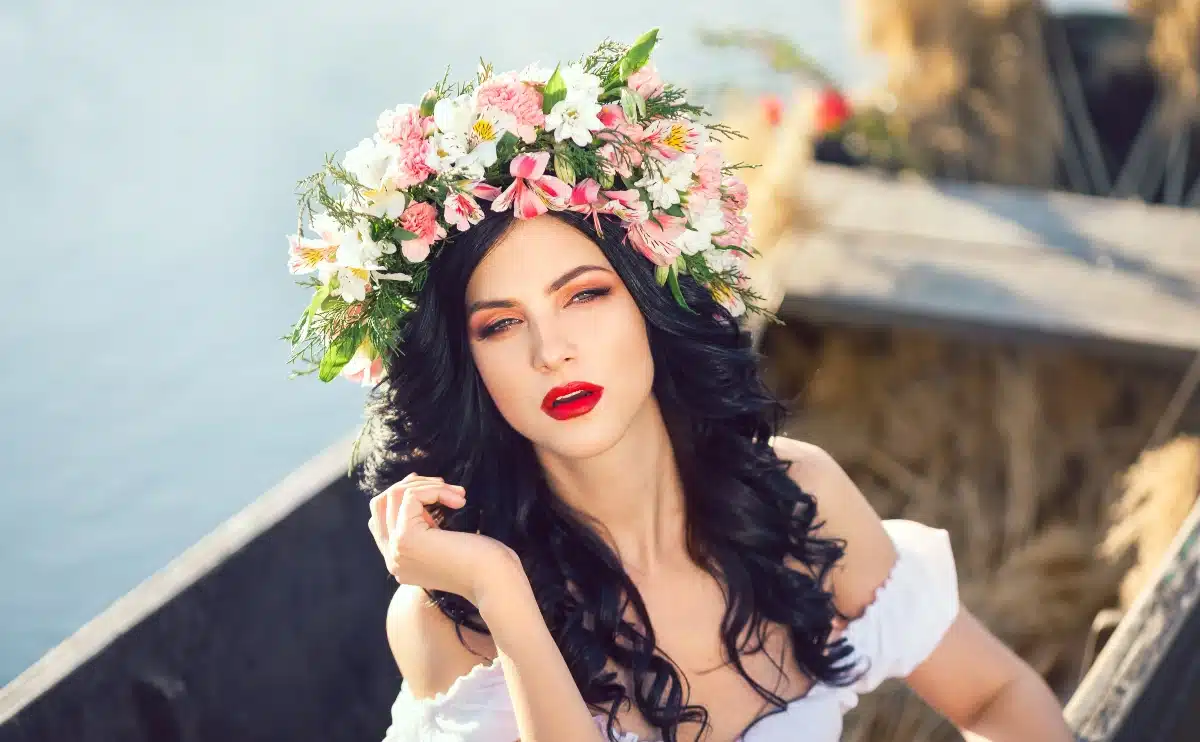
Cryptic Poems About the Unknown
Immerse yourself in a collection of the most enigmatic poems about the unknown, carefully curated for your poetic journey.
Whether you’re seeking works that delve into the mystifying realms of uncertainty, or contemplate the awe-inspiring vastness of the undiscovered, our anthology provides a diverse range of captivating examples.
With our thoughtfully curated selection, the finest poems about the unknown are all conveniently located in one place.
So, take a moment to explore and marvel at the mystery and intrigue these verses have inspired in poets through the centuries!
Let’s get started!
My #1 Favorite Poems About the Unknown
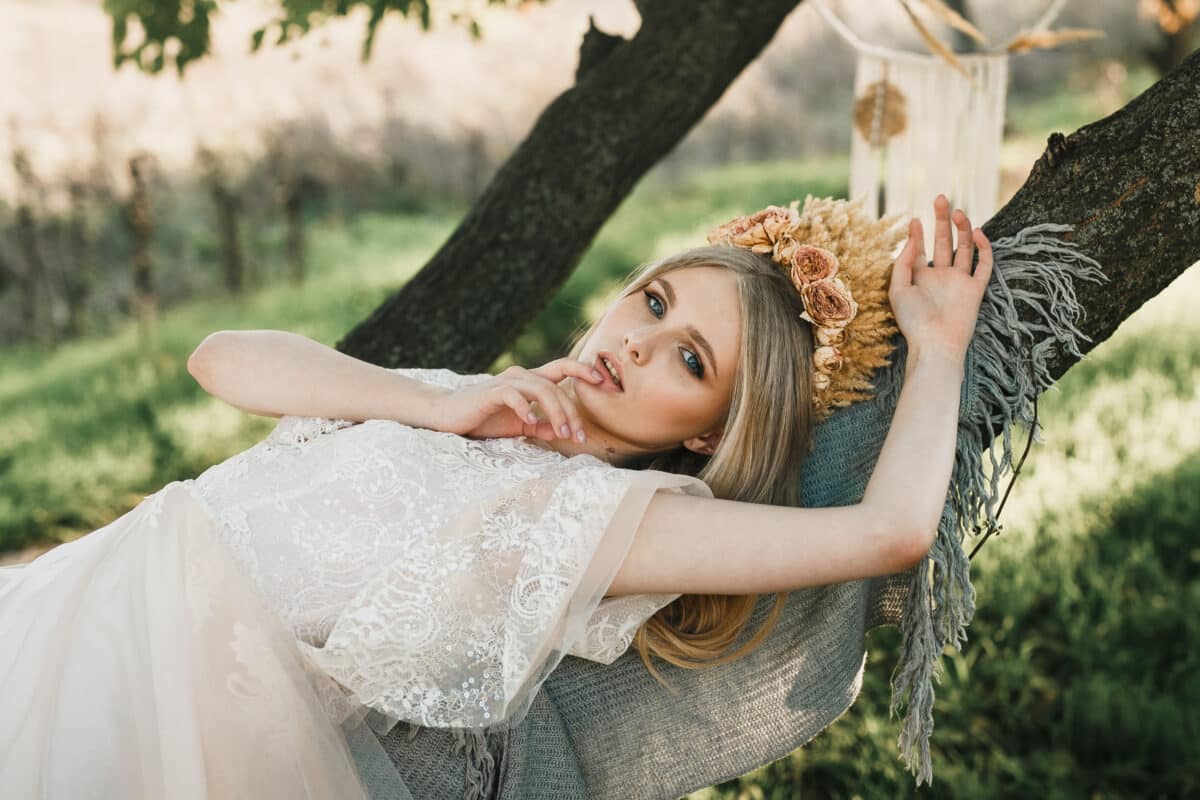
“The Unexpressed” by Sidney Royse Lysaght
Earth’s voices tremble with the unexpressed, —
That was some former life’s forgotten word
That o’er the waters in the night wind stirred!
And dreams untold and secrets never guessed.
They give us clues, but keep from us the rest,—
The sweetest notes of wind and wave and bird
Tell us of songs that none have ever heard,—
And send us forth upon an unknown quest.
They keep their secrets: bird and wave and breeze
Whisper each other’s, but withhold their own.
The evening wind at home among the trees
Sings of the wandering waves of oceans lone;
And here the waves of the uncharted seas
Murmur the wind’s familiar woodland tone.
Short Poems About the Unknown
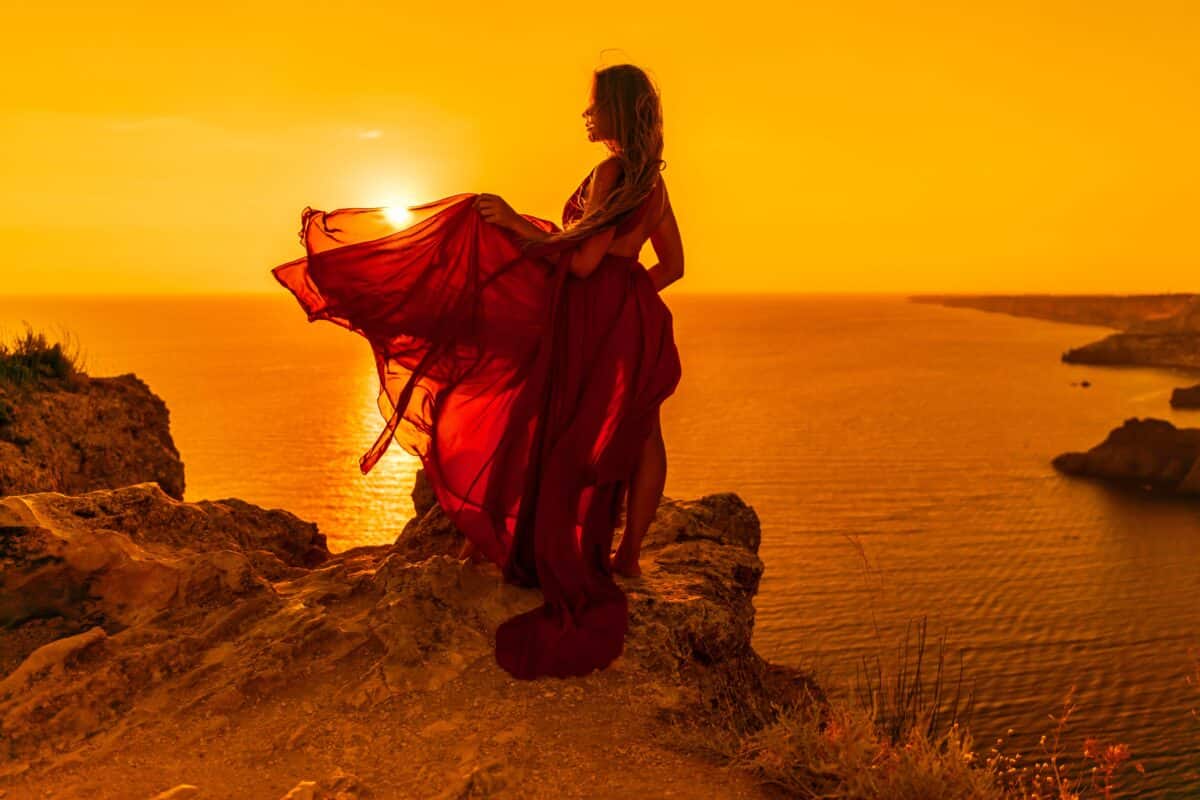
“To One Unknown” by Helen Dudley
I have seen the proudest stars
That wander on through space,
Even the sun and moon,
But not your face.
I have heard the violin,
The winds and waves rejoice
In endless minstrelsy,
Yet not your voice.
I have touched the trillium,
Pale flower of the land,
Coral anemone,
And not your hand.
I have kissed the shining feet
Of Twilight, lover-wise,
Opened the gates of Dawn:
Oh, not your eyes!
“A Star” by Sidney Royse Lysaght
Night after night you watch one star appear ;
And in your heart those hours you enshrine
When on our ocean path we see it shine.
You tell me by what name men know it here,
And call it yours and mine.
For you it makes those spaces, still and lone,
Kinder, the awe of the unfathomed less,
And gives the infinite a homeliness;
As some familiar flower, in lands unknown,
A wanderer’s path may bless.
To me its gleam of tender radiance links
No Heaven with the earth we leave behind;
But seems a light, o’er wastes of wave and wind,
That shows a wanderer, on a ship that sinks,
The shore he may not find.
“Loneliness Of Truth-Seeking” by Minot Judson Savage
‘Twas ever so, that he who dared
To sail upon a sea unknown
Must go upon a voyage unshared,
And brave its perils all alone.
He who from Palos, toward the west,
Sought for a new world o’er the sea,
Sailed forth distrusted and unblest,
While e’en his ship hatched mutiny.
And he who, not content to sit
And dream of far-off shores of truth,
Watching the sea-bird fancies flit
And wavelets creep through all his youth,
Must sail unblest of those behind,
And bear e’en love’s reproaching tone :
Only the guiding God is kind
To him who dares to sail alone.
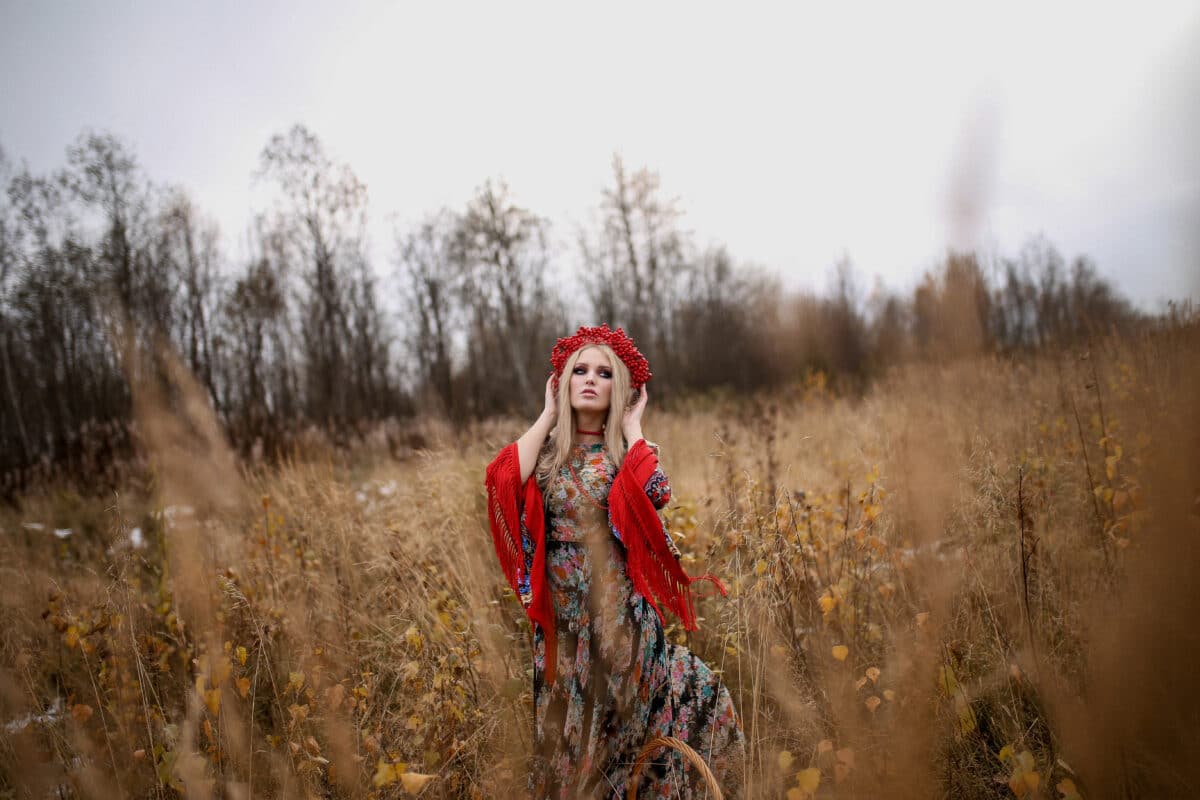
“My Love for Thee” by Louise Chandler Moulton
I must pursue him, made by sorrow bold,
Through worlds unknown, in strange celestial race,
Whose mystic round no traveller has told ,
From star to star, until I see his face.
“Sonnet” by Frances Anne Butler
Say thou not sadly, “never,” and “no more,”
But from thy lips banish those falsest words;
While life remains that which was thine before
Again may be thine; in Time’s storehouse lie
Days, hours, and moments, that have unknown hoards
Of joy, as well as sorrow: passing by,
Smiles, come with tears; therefore with hopeful eye
Look thou on dear things, though they turn away,
For thou and they, perchance, some future day
Shall meet again, and the gone bliss return;
For its departure then make thou no mourn,
But with stout heart bid what thou lov’st farewell;
That which the past hath given the future gives as well.
“The Morning of Life” by Victor Hugo
The mist of the morning is torn by the peaks,
Old towers gleam white in the ray,
And already the glory so joyously seeks
The lark that’s saluting the day.
Then smile away, man, at the heavens so fair,
Though, were you swept hence in the night,
From your dark, lonely tomb the owlets would stare
At the sun rising newly as bright.
But out of earth’s trammels your soul would have flown
Where glitters Eternity’s stream,
And you shall have waked ‘midst pure glories unknown,
As sunshine disperses a dream.

“Desire” by Emily Dickinson
Who never wanted, — maddest joy
Remains to him unknown:
The banquet of abstemiousness
Surpasses that of wine.
Within its hope, though yet ungrasped
Desire’s perfect goal,
No nearer, lest reality
Should disenthrall thy soul.
“Invisible” by Emily Dickinson
From us she wandered now a year,
Her tarrying unknown;
If wilderness prevent her feet,
Or that ethereal zone
No eye hath seen and lived,
We ignorant must be.
We only know what time of year
We took the mystery.
“A dew sufficed itself” by Emily Dickinson
A dew sufficed itself
And satisfied a leaf,
And felt, ‘how vast a destiny!
How trivial is life!’
The sun went out to work,
The day went out to play,
But not again that dew was seen
By physiognomy.
Whether by day abducted,
Or emptied by the sun
Into the sea, in passing,
Eternally unknown.

“The Unknown God” by Walter Murdoch
Far up the dim twilight fluttered
Moth-wings of vapour and flame:
The lights danced over the mountains,
Star after star they came.
The lights grew thicker unheeded,
For silent and still were we;
Our hearts were drunk with a beauty
Our eyes could never see.
“Bitter-Sweet” by Henry Van Dyke
Just to give up, and trust
All to a Fate unknown,
Plodding along life’s road in the dust,
Bounded by walls of stone;
Never to have a heart at peace;
Never to see when care will cease;
Just to be still when sorrows fall—
This is the bitterest lesson of all.
Just to give up, and rest
All on a Love secure,
Out of a world that’s hard at the best,
Looking to heaven as sure;
Ever to hope, through cloud and fear,
In darkest night, that the dawn is near;
Just to wait at the Master’s feet—
Surely, now, the bitter is sweet.
“Inscription From A Tomb In England” by Henry Van Dyke
Read here, O friend unknown,
Our grief, of her bereft;
Yet think not tears alone
Within our hearts are left.
The gifts she came to give,
Her heavenly love and cheer,
Have made us glad to live
And die without a fear.

“Unknown Friends by René François Armand Prudhomme” (E. and R. E. Prothero, Translator)
One line may, like a friend who knows us well,
Re-ope the wound whose smart is not forgot;
The word that doth another’s sufferings tell
May drop like tears on our own anguished spot,
Where heart misjudged awaits its soothing spell.
My verse, perchance, may reach you and restore,
With lightning flash, the sleeping grief of old;
Or by that one true word—long waited for—
The sudden name of all you feel unfold,
Nor tell the eyes from whom I learnt my lore.
Poems About the Unknown Future

From “The Undiscovered Shore” by Sidney Royse Lysaght
To My Comrades
O you of little faith, the promised heir
Of life eternal, mourning days that were;
You, who to lift up one beloved head
Out of the dust and feel one presence nigh,—
To make again one vanished summer live,
Your birthright of eternal life would give!
I also murmur, ” Give me back my dead!”
The comrade ofyour unbelief am I.
You, against whom all fates have been arrayed;
Who heard the voice of God and disobeyed;
Who, reckless and with all your battles lost,
Went forth again another chance to try;
Who, fighting desperate odds yet fought to win,
And sinning bore the burden ofyour sin!
We have been on the same rough ocean tossed,
And served the same wild captain, you and I.
You, who desired no laurel of the race
But the approval of one absent face;
For whom has earth no home, no place of rest
Save in the bosom where you may not lie;
Beggared of all but Love’s immortal right,
Still for the sake of one you lost to fight!
Oh, we have met upon the unknown quest
And watched the stars together, you and I!
O wanderer, if at last your ship should find
Home, and the sheltered havens left behind,
I shall be with you in that merry crew
Under the same old flag we used to fly;
But, if at last, of every promise shorn,
With leaking timbers and with canvas torn,
Still for the pride of seamanship sail you,—
There also, in your chartless ship, sail I.
“Unknown Ideal” by Dora Sigerson Shorter
Whose is the voice that will not let me rest?
I hear it speak.
Where is the shore will gratify my quest,
Show what I seek?
Not yours, weak Muse, to mimic that far voice,
With halting tongue;
No peace, sweet land, to bid my heart rejoice
Your groves among.
Whose is the loveliness I know is by,
Yet cannot place?
Is it perfection of the sea or sky,
Or human face?
Not yours, my pencil, to delineate
The splendid smile!
Blind in the sun, we struggle on with Fate
That glows the while.
Whose are the feet that pass me, echoing
On unknown ways?
Whose are the lips that only part to sing
Through all my days?
Not yours, fond youth, to fill mine eager eyes
Or find that shore
That will not let me rest, nor satisfies
For evermore.
“The Soul of the Wanderer” by Sidney Royse Lysaght
O Wanderer, look deep into your soul
And ask what blessing you desire most!
Now when the stars that guided you are lost,
And in the stormy deep you find no goal.
Would you the haven’s rest, O wanderer?
Rest from the conflict of the beating seas,
Home and a sheltered garden and fair trees,
And gentle winds that in the woodland stir?
Would you the song of birds, the hum of bees,
And far away the murmur of the shore?
Nay, for if these were given to you, and more,
You would not long remain content with these.
Then would old dreams become to you a spur,
And tell of distant quests and running seas,
And lights of unknown ports at twilight glowing:
Then would you gladly give your woodland peace
To win the freedom of the wanderer,
And feel the winds of the world about you blowing:
Then would you muse on all that you had lost;
Your garden boundaries would seem as walls
Between you and the hope supreme, that calls
Over the waters to the tempest- tossed.
Yet, should you find again the wild sea track,
Whispers of woodland peace would call you back.
There is a weariness of sailing on
Without a goal, a weariness of rest
In haunts of peace, while there remains a quest
Unventured, or a battle still unwon.
You would not of the homeless ocean tire
If you could know your seeking had not failed,
That every long watch kept, each storm out sailed,
Should bring you nearer to your heart’s desire;
If you could see, beyond the dark and rough,
Hope of the haven lights, of torn sails furled,
And love that waited for you, dear enough
To make your garden boundaries your world.
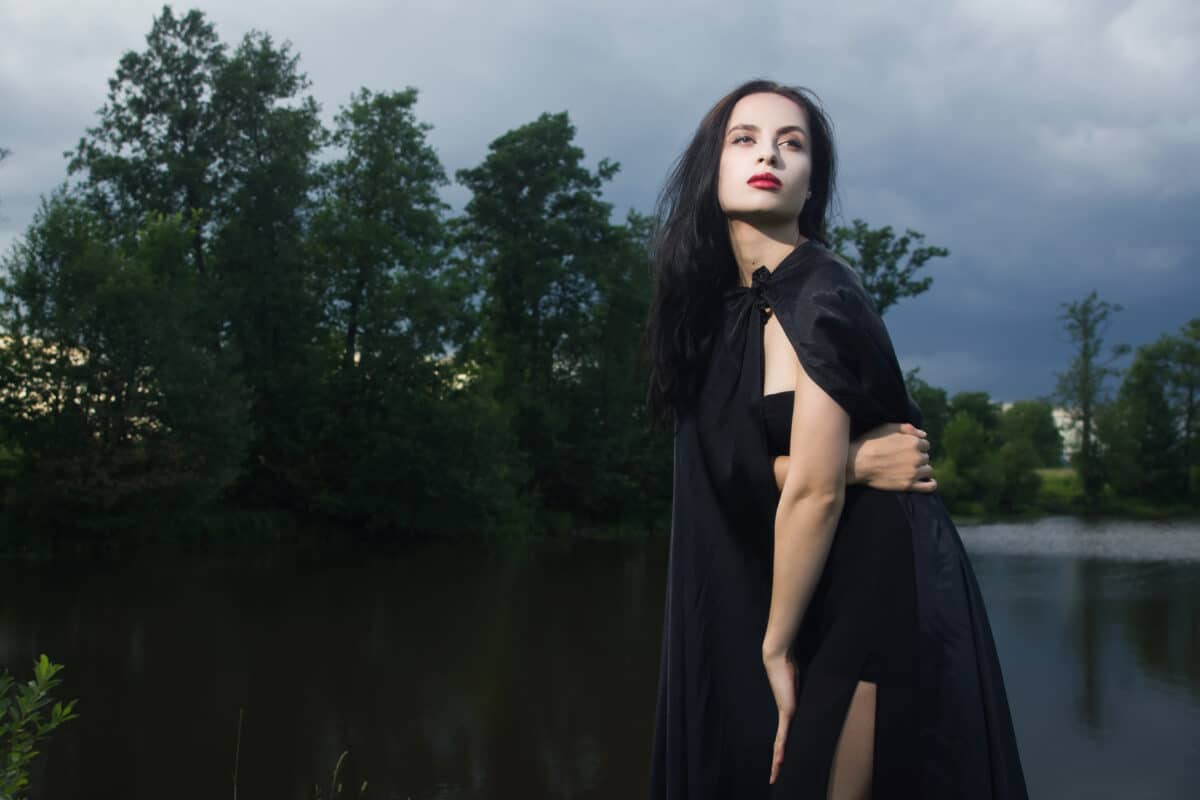
“The Unexplored” by Sidney Royse Lysaght
Out of lonely seas we sailed
After dusk, and crossed the bar
Ere the darkness wholly veiled
Haven shores and lands afar;
Ere the path of wild- rose light
O’er the hills had faded quite,
Or the shore-lights’ golden rays
Glowed across the water-ways.
Wonderlands of which we dreamed
Over the unventured seas
Never more enchanted seemed,
Never lovelier than these;
These that, hidden till the dawn
Now no boundary confines,
Save where starry skies have drawn
Silvery horizon lines.
There, between the veiled and shown,
Wonders hidden are our own;
Forest voices whisper there
Lore of days that never were;
Secrets vision hides we find
Written in the undefined;
Revelations in the guessed,
Treasures in the unpossessed.
Darker, over waters dark,
Loom the shores; and still remains,
Here and there, a light to mark
Ships along the haven lanes.
Softer, over ripples soft,
Far away the sea-winds blow;
Fairer than the stars aloft
Shine the stars in depths below.
Ah! what seek we?
While we wonder, we endow
All things near us and afar
With the dreams that nowhere are:
Even now,
Reading into the unknown
Hopes that we have long outgrown,
Weaving into the unseen
Tidings of the might- have-been.
Soon along the eastern rim
Light shall steal, and silver mist
Flash to rose, and uplands dim
Wake in folds of amethyst.
Soon shall tidings twilight told,
Soon shall pathways starlight drew
Vanish in the morning’s gold,
Hide behind the noonday’s blue.
Now, till morn, remain our own
Magic shores of old surmise,
Peaks no morning can dethrone,
Lands that know no boundaries.
There the unfulfilled abides;
There the touch of night unbars
Gates of ways that noonday hides,
Paths that reach beyond the stars.
“The Future Life” by William Cullen Bryant
How shall I know thee in the sphere which keeps
The disembodied spirits of the dead,
When all of thee that time could wither sleeps
And perishes among the dust we tread?
For I shall feel the sting of ceaseless pain
If there I meet thy gentle presence not;
Nor hear the voice I love, nor read again
In thy serenest eyes the tender thought.
Will not thy own meek heart demand me there?
That heart whose fondest throbs to me were given;
My name on earth was ever in thy prayer,
And wilt thou never utter it in heaven?
In meadows fanned by heaven’s life-breathing wind,
In the resplendence of that glorious sphere,
And larger movements of the unfettered mind,
Wilt thou forget the love that joined us here?
The love that lived through all the stormy past,
And meekly with my harsher nature bore,
And deeper grew, and tenderer to the last.
Shall it expire with life, and be no more?
A happier lot than mine, and larger light,
Await thee there; for thou hast bowed thy will
In cheerful homage to the rule of right,
And lovest all, and renderest good for ill.
For me, the sordid cares in which I dwell,
Shrink and consume my heart, as heat the scroll;
And wrath has left its scar—that fire of hell
Has left its frightful scar upon my soul.
Yet though thou wear’st the glory of the sky,
Wilt thou not keep the same belovèd name,
The same fair thoughtful brow, and gentle eye,
Lovelier in heaven’s sweet climate, yet the same?
Shalt thou not teach me, in that calmer home,
The wisdom that I learned so ill in this—
The wisdom which is love—till I become
Thy fit companion in that land of bliss?
“Future Poetry” by Alice Christiana Thompson Meynell
No new delights to our desire
The singers of the past can yield.
I lift mine eyes to hill and field,
And see in them your yet dumb lyre,
Poets unborn and unrevealed.
Singers to come, what thoughts will start
To song? what words of yours be sent
Through man’s soul, and with earth be blent?
These worlds of nature and the heart
Await you like an instrument.
Who knows what musical flocks of words
Upon these pine-tree tops will light,
And crown these towers in circling flight
And cross these seas like summer birds,
And give a voice to the day and night?
Something of you already is ours;
Some mystic part of you belongs
To us whose dreams your future throngs,
Who look on hills, and trees, and flowers,
Which will mean so much in your songs.
I wonder, like the maid who found,
And knelt to lift, the lyre supreme
Of Orpheus from the Thracian stream.
She dreams on its sealed past profound;
On a deep future sealed I dream.
She bears it in her wanderings
Within her arms, and has not pressed
Her unskilled fingers, but her breast
Upon those silent sacred strings;
I, too, clasp mystic strings at rest.
For I, i’ the world of lands and seas,
The sky of wind and rain and fire,
And in man’s world of long desire–
In all that is yet dumb in these–
Have found a more mysterious lyre.

“Uncertainty” by Madison Julius Cawein
It will not be to-day and yet
I think and dream it will; and let
The slow uncertainty devise
So many sweet excuses, met
With the old doubt in hope’s disguise.
The panes were sweated with the dawn;
Yet through their dimness, shriveled drawn,
The aigret of one princess-feather,
One monk’s-hood tuft with oilets wan,
I glimpsed, dead in the slaying weather.
This morning, when my window’s chintz
I drew, how gray the day was!-Since
I saw him, yea, all days are gray!-
I gazed out on my dripping quince,
Defruited, gnarled; then turned away
To weep, but did not weep: but felt
A colder anguish than did melt
About the tearful-visaged year!-
Then flung the lattice wide, and smelt
The autumn sorrow: Rotting near
The rain-drenched sunflowers bent and bleached,
Up which the frost-nipped gourd-vines reached
And morning-glories, seeded o’er
With ashen aiglets; whence beseeched
One last bloom, frozen to the core.
The podded hollyhocks,-that Fall
Had stripped of finery,-by the wall
Rustled their tatters; dripped and dripped,
The fog thick on them: near them, all
The tarnished, haglike zinnias tipped.
I felt the death and loved it: yea,
To have it nearer, sought the gray,
Chill, fading garth. Yet could not weep,
But wandered in an aimless way,
And sighed with weariness for sleep.
Mine were the fog, the frosty stalks;
The weak lights on the leafy walks;
The shadows shivering with the cold;
The breaking heart; the lonely talks;
The last, dim, ruined marigold.
But when to-night the moon swings low-
A great marsh-marigold of glow-
And all my garden with the sea
Moans, then, through moon and mist, I know
My love will come to comfort me.
From “Tired Memory” by Coventry Patmore
Did thee, my own most Dear, Possess
In gay, celestial beauty nothing coy,
And felt thy soft caress
With heretofore unknown reality of joy.
But, in our mortal air,
None thrives for long upon the happiest dream,
And fresh despair
Bade me seek round afresh for some extreme
Of unconceiv’d, interior sacrifice
Whereof the smoke might rise
To God, and ‘ mind him that one pray’d below.
And so,
In agony, I cried:
“My Lord, if thy strange will be this,
“That I should crucify my heart,
“Because my love has also been my pride,
“I do submit, if I saw how, to bliss
“Wherein She has no part.”
And I was heard,
And taken at my own remorseless word.
“Outward Bound” by Sidney Royse Lysaght
Down the horizons, ring by ring,
Over the windy seas we swing:
We are away for Eldorado,
Up in the bows the sailors sing.
For many a day the wind was fair;
We passed to the south of Finisterre;
We heard the chimes of the bells of Lisbon
Blown over-sea on the evening air.
We crossed the plains of the old sea-wars,
And old-world harbours with crowded spars;
And over the vales of Andalusia
Fell the night and arose the stars.
And, sailing by sea-ways old, we came
To many a coast of ancient fame,
Where every isle has a golden story,
And every haven a golden name.
But bells beyond the horizon rung,
And stars grown old when the world was young,
Called us away to the unknown seas
Of the isles un-named and the songs unsung.
The haven’s rest and the comrades kind,
And the maidens merry we leave behind:
We are away for Eldorado,
Our dreams to seek and our lost to find.
Wilder each morn the west wind blows,
Softer each night the starlight glows:
We are away for Eldorado,
Over the sea that no man knows.
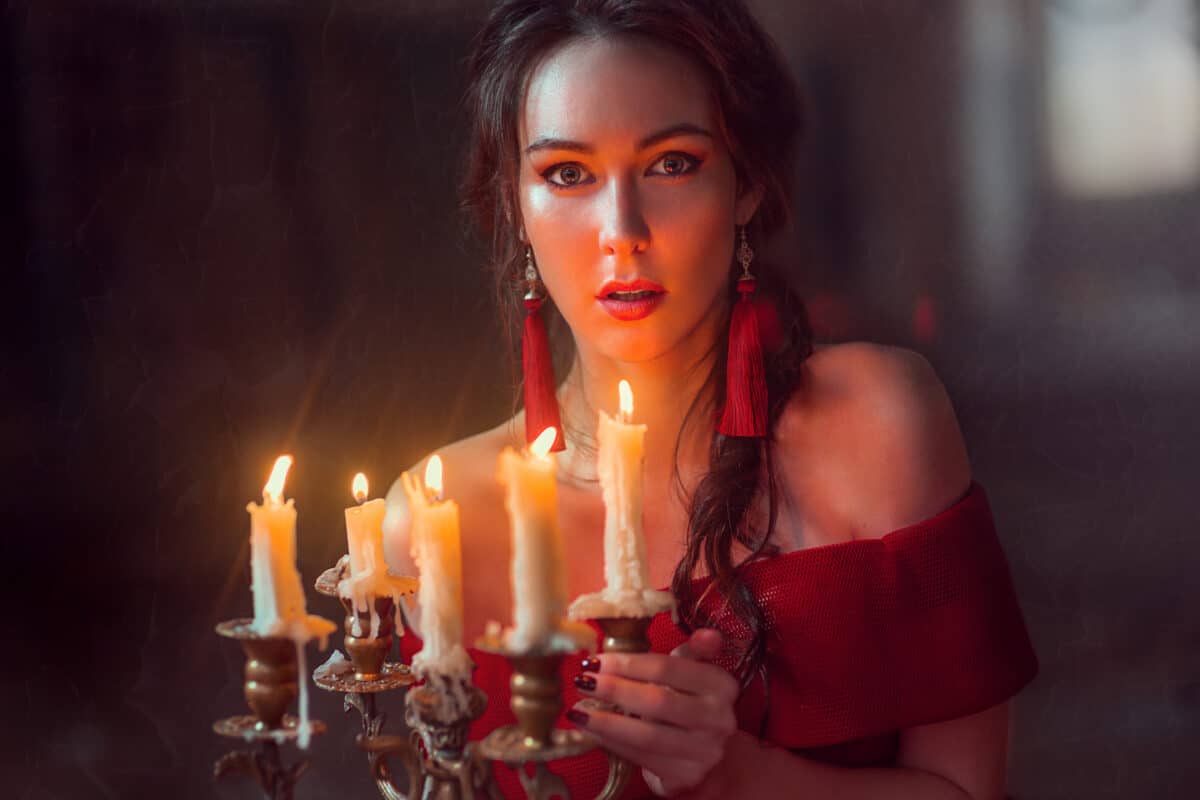
“Facing The Unknown” by Minot Judson Savage
O New Year, New Year, tell me true,
What wilt thou bring to me, —
Bring to me out of the heavens blue,
Where thy bright home must be?
Thou comest, godlike, in a cloud:
I cannot see thy form;
Is’t sunshine that the mists enshroud,
Or lurketh there a storm?
I stretch my hands out unto thee;
Oh, speak to me and say!
I’d know what things shall come to me
Along this untrod way.
The old year gave me buds to hold;
And while I tended them,
And watched to see the flowers unfold,
They faded on the stem.
She whispered promises so fair
They drove away all fears;
But clouds drank up the sunny air,
And dripped in rainy tears.
She took me up on vision heights,
And showed a prospect sweet ;
But I have stumbled through the nights
With weary, bleeding feet.
So tell me, New Year, what’s to be
Upon each new to- morrow.
Shall my bright hopes abide with me,
Or change to shapes of sorrow?
A low-voiced wind came whispering
From out the mystery:
“I am the New Year, and I bring
That which is given to me.
“Thou livest not alone for joy,
Or but to gather flowers.
Lament not, then, what storms destroy,
Nor chide the dark-winged hours.
“Through cloud and sun and dripping rain
The Year her garment weaves,
And clothes the earth with golden grain
And decks with autumn leaves.
“And all the mingled days conspire
To make her work complete.
Even discords tremble on her lyre
To make the song more sweet.
“Not what thou hast, but what thou art,
And what thou yet shalt be:
Each year is but a verse, a part
Of life’s full poesy.
“The minor mingles with the gay;
And, when the song is done,
Thou’lt see how each its part did play
To make the poem one.
“Then ask not what’s ahead of thee,
Each day thy part fulfil;
Be sure that thy life’s mystery
Obeys a higher will .
“‘Tis love that in the darkness leads;
My face thou may’st not see;
It is enough for all thy needs
That thou do follow me.”
From” The Cloud Confines” by Dante Gabriel Rossetti
The day is dark and the night
To him that would search their heart;
No lips of cloud that will part
Nor morning song in the light:
Only, gazing alone,
To him wild shadows are shown,
Deep under deep unknown
And height above unknown height.
Still we say as we go,-
” Strange to think by the way,
Whatever there is to know,
That shall we know one day.”
The Past is over and fled;
Named new, we name it the old;
There of some tale hath been told,
But no word comes from the dead;
Whether at all they be,
Or whether as bond or free,
Or whether they too were we,
The Past is over and fled;
Or by what spell they have sped.
Still we say as we go,-
” Strange to think by the way,
Whatever there is to know,
That shall we know one day.”
“The Sea Plains” by Sidney Royse Lysaght
It was evening, and we came to the seas where
the south wind sleeps;
And the skies were of softer bloom than
those we had seen of old.
The glimmering plains of the sea to wider
horizons rolled:
Great stars were watching in darker and lonelier
deeps.
Late in the afternoon the shafts of the sunlight
smote
The clouds to a mystic change, as with
touch of enchanters’ rods;
nd at twilight and at night strange shapes,
as in dreams of gods,
Phantasmal, stood on the sea, or wandered in
tracts remote.
On amber skies to northward the dark sea
forests gloomed;
Strange knights on unknown quests were
out on the golden plains ;
A sorceress, by the sun- gates, spun woofs
of crimson skeins;
Over the south horizon a fleet of galleons
loomed.
And a cloud on the eastern sky, fold on
billowy fold
Built to a dome of rose, stood out of the
dark sea-blue;
And thunder out of it came, and lightning
threaded it through,
Crowning its dome with fire and flashing its
rose with gold.
And now in the light of the moon, and now in
the light of the stars,
A sound as of tired wings high over the top
mast stirred.
And lo! when the moon was set and the
stars were hidden, we heard
The cannon of long-fought fields, the murmur
of old sea-wars.
Where doth our venture lead? Oh, it’s south
ward still we go!
It was evening, -and we passed from the
seas where the south winds sleep.
And under the bows at night the waves
began to leap;
And ’twas morning, and we came to the seas
where the south winds blow.
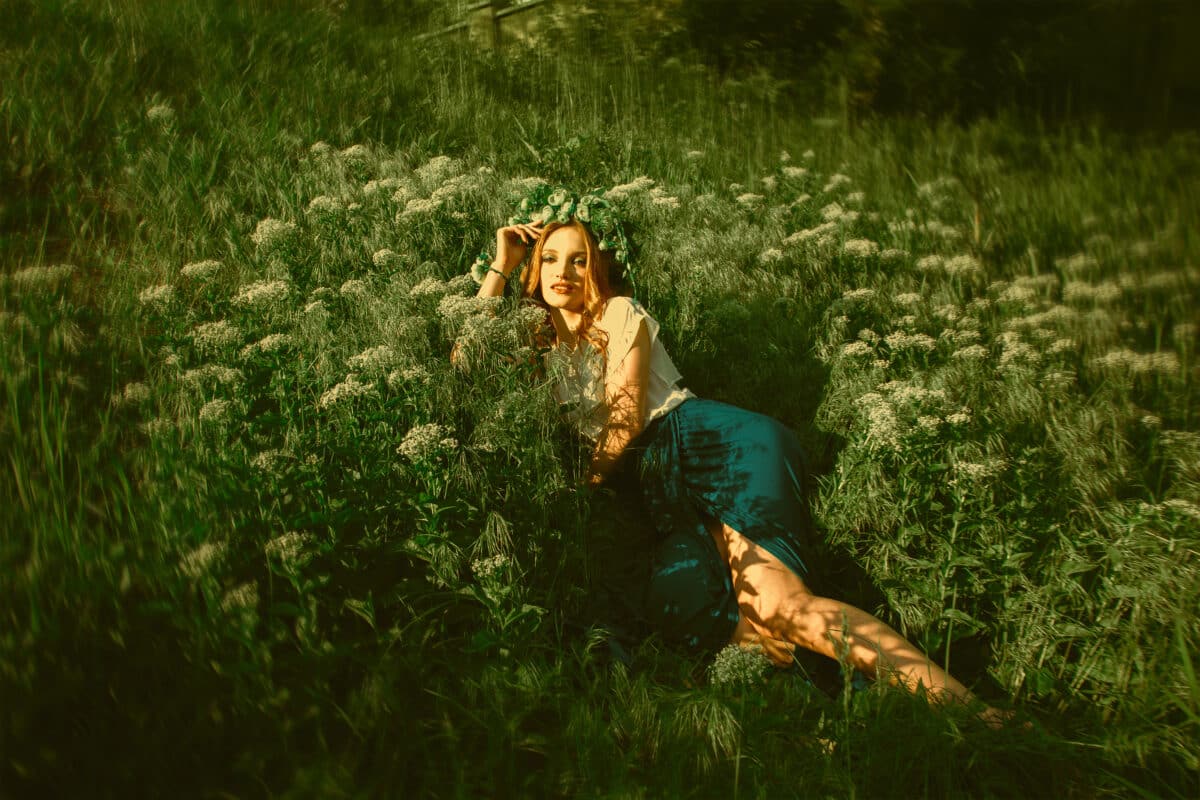
“The Islands” by Sidney Royse Lysaght
We thought no more of the morrow, we forgot
the oath we swore,
And the hope of our great adventure, and
the old- world griefs,—
For we saw the moonlight shining on the
folds of silver reefs,
And we heard the wind in the palm-trees, and
the song of an island shore.
In the calm of the ocean cloisters, ringed in
the outer blue,
Were ours the windless havens of the flower
blue coral seas:
We wandered apart at noonday in the
twilight of the trees,”
In the island rest enfolded, unburdened of all
we knew.
Down to the sands of silver ran the long palm
lanes:
Oh the vales of dark ovava, and the oleander
glades!
Above our heads in lucent domes of inter
woven shades
Blue belfries of convolvulus hung down from
airy chains.
With chiefs, by the ovava tree, we drank ofthe
kava bowl;
We lay us down in the starlight under
oleander boughs:
The sleep-touch of the island maids was soft
upon our brows,
Through winding ways of hidden life their
dream-song stole.
Oh ! why may we stay not here and forget the
unknown quest?
Why were we born to decide between the
good and the ill?
Why were we born to begin a task we may
ne’er fulfil?
Oh ! why were we born to love with a love
that brings no rest?
We passed by the graves of the island kings,
and the trees at the graves;
We stood beneath the ghost-trees,-soft the
night wind stirred;
And of strange forgotten sorrows in voices
far we heard;
And amid the ghost- trees’ whisper was the
murmur of northern waves.
Old spells were cast about us, and the magic
of old decrees:
We cannot turn from our future, we cannot
hide from our past;
For us the way is onward, and we gathered
about the mast,
And we sailed away in the dawn from the isles
of the flower-blue seas.
From “A Psalm” by Sidney Royse Lysaght
The Gods are dead and gone,
As the seers of old who framed them,
And the golden tongues that named them,
And the cruel wits that maimed them ;
And behold ! we stand alone
Glad of birth, and without fear;
With the same far Heaven o’er us,
And the unknown road before us,
Toil, and slumber to restore us,
Pain, and Love to give us cheer.
Seek we Earth to understand!
Read the fruit-time and the sowing,
And the winds of winter blowing,
And the sunshine and the flowing
Of the waters in the land.
Love the heroes and their deeds;
Stand where comrades may require us;
Let our country’s honour fire us,
And a woman’s love inspire us!
These are Faith: the rest were creeds.
If we Earth have understood,
Trusted, asking not completeness,
Known a comrade’s help, the sweetness
Of a girl’s love, need we witness
Beyond these that Life is good?
Love it well ! and comes a time,
Though our Gods be all departed,
We shall find us merry-hearted,
Nearer Heaven than those who started,
Scorning Earth, the upward climb.
“The Unknown Country” by Dinah Mulock Craik
“Where is the unknown country?”
I whispered sad and slow-
“The strange and awful country
To which I soon must go, must go,
To which I soon must go?”
Out of the unknown country
A voice sang soft and low,
“Oh, pleasant is that country,
And sweet it is to go, to go,
And sweet it is to go.
“Along the shining country
The peaceful rivers flow:
And in that wondrous country
The tree of life does grow, does grow,
The tree of life does grow.”
Ah, then into that country
Of which I nothing know,
The everlasting country,
With willing heart I go, I go,
With willing heart I go.
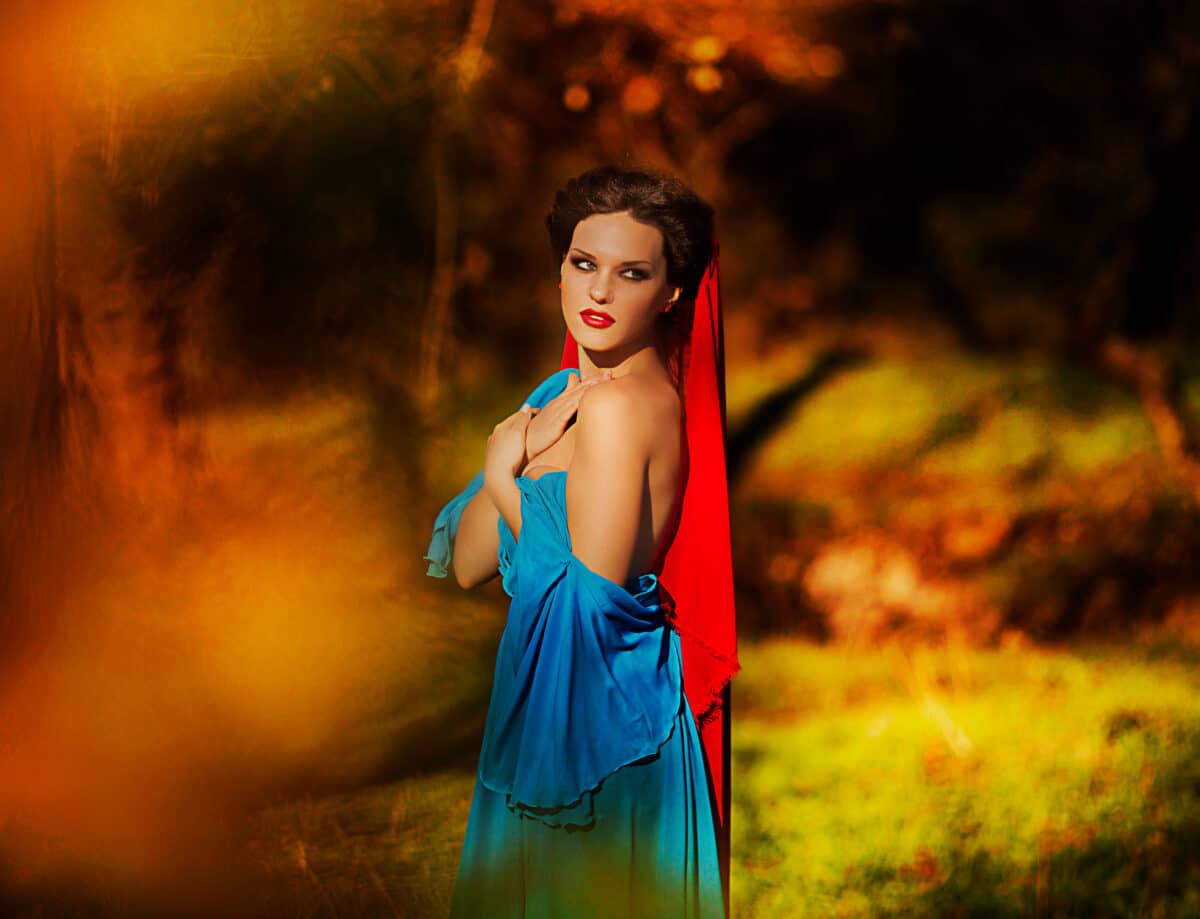
From “An Epistle To The Laodiceans” by Sidney Royse Lysaght
Lamely ye go on your way!
opinions ye halt,
Fearing to trust or deny, and making a creed
of your doubts;
Seeing two pictures of life and living untrue to
them both.
Look on your pictures in turn! Ponder this
reading of Life!
A world among worlds unknown, a pause in
the infinite blue,
Man looking forth and around, knowing not
whence he has come
Nor what the beginning nor end nor intent of
the life he perceives.
A little while given for labour, a little while
given for love,
A little while given to follow the windings of
wandering ways,
And then the eternal farewell. Ever the ebb
and the flow,
Ever the growth from decay, ever the flower
from the seed,
Ever the change called Death ; but never
beginning nor end.
Nor finds he has faith in the future, who knows
that an infinite past
Has dealt its eternal mutations to fashion the
life he beholds.
“Waiting For The Bugle” by Thomas Wentworth Higginson
We wait for the bugle ; the night dews are cold,
The limbs of the soldiers feel jaded and old,
The field of our bivouac is windy and bare,
There is lead in our joints, there is frost in our hair ;
The future is veiled and its fortunes unknown
As we lie with hushed breath till the bugle is blown.
At the sound of that bugle each comrade shall spring
Like an arrow released from the strain of the string ;
The courage, the impulse of youth shall come back
To banish the chill of the drear bivouac,
And sorrows and losses and cares fade away
When that life-giving signal proclaims the new day.
Though the bivouac of age may put ice in our veins,
And no fibre of steel in our sinews remains,
Though the comrades of yesterday’s march are not here,
And the sunlight seems pale and the branches are sere,
Though the sound of our cheering dies down to a moan,
We shall find our lost youth when the bugle is blown.
“The Meditation” by Divine hymns, Wentworth Dillon (4th earl of Roscommon.), Elisabeth Rowe
I.
It must be done, my Soul, but ‘ tis a strange,
A dismal, and myfterious Change !
Whenthou shalt leave this Tenement of Clay,
And to an unknown Somewhere wing away,
When Time shall be Eternity, and thou
Shalt be thou know’st not what , and live thou
know’st not how.
II.
Amazing State! No Wonder that we dread
To think of Death, or view the Dead ;
Thou’rt all wrapt up in Shades, as if to thee
Our very Knowledge had Antipathy :
Death could not a more fad Retinue find,
Sickness and Pain before, and Darkness all behind.
III.
Some courteous Ghoft tell this great Secrecy ,
What ‘ tis you are, and we must be.
You warn us of approaching Death, and why?
May we not know from you what ‘ tis to die ?
But you having shot the Gulph, delight to fee
Succeeding Souls plunge in with like Uncertainty..
IV.
When Life’s close Knot by Writ, from Destiny,
Disease shall cut, or Age untye,
When after fome Delays, fome dying Strife,
The Soul stands shivering on the Ridge of Life,
With what a dreadful Curiosity
Does the launch out into the Sea of vast Eternity.
V.
So when the spacious Globe was delug’d o’er,
And lower Holds could fave no more,
On th’ utmoſt Boughs th’ astonish’d Sinners stood,
And view’d th’ Advances of th’ incroaching Flood ;
Oe’r-topp’d at length by th’ Elements Increase,
With Horror they resign’d to the untry’d Abyss.
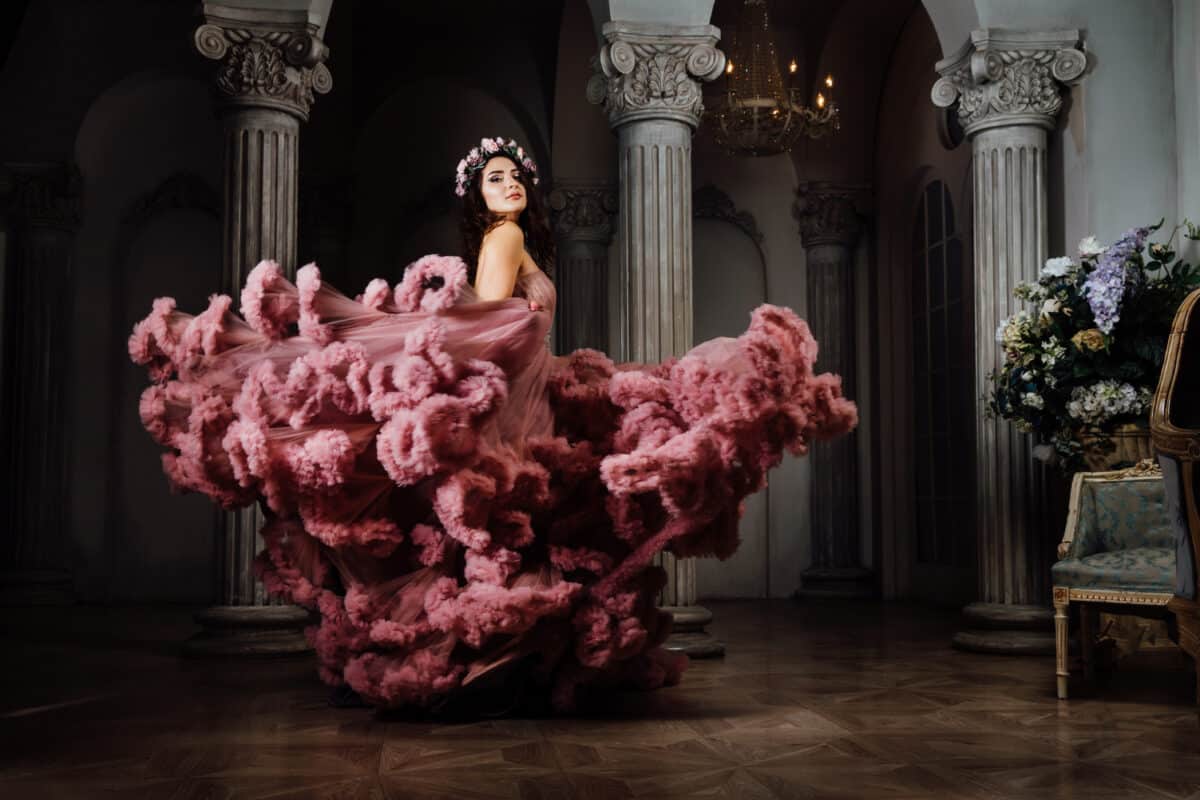
From “The Prospect” by Divine hymns, Wentworth Dillon (4th earl of Roscommon.), Elisabeth Rowe
I.
What a strange Moment will it be,
My Soul? How full of Curiosity?
When wing’d and ready for thy Eternal Flight,
To th’ utmost Edges of thy tottering Clay,
Hovering, and wishing longer Stay,
Thou shalt advance, and have Eternity in Sight
When just about to try that unknown Sea,
What a strange Moment will it be!
II.
But yet how much more strange that State!
When loosen’d from th’ Embrace of this close Mate,
Thou shalt at once be plung’d in Liberty,
And move as Swift and Active as a Ray
Shot from the lucid Spring of Day.
Thou who just now waft clogg’d with dull Mortality,
How wilt thou bear the mighty Change? How know
Whether thou’rt then the fame or no?
“The Blinded Bourbons” by Victor Hugo
Who then, to them had told the Future’s story?
Or said that France, low bowed before their glory,
One day would mindful be
Of them and of their mournful fate no more,
Than of the wrecks its waters have swept o’er
The unremembering sea?
That their old Tuileries should see the fall
Of blazons from its high heraldic hall,
Dismantled, crumbling, prone;
Or that, o’er yon dark Louvre’s architrave
A Corsican, as yet unborn, should grave
An eagle, then unknown?
That gay St. Cloud another lord awaited,
Or that in scenes Le Nôtre’s art created
For princely sport and ease,
Crimean steeds, trampling the velvet glade,
Should browse the bark beneath the stately shade
Of the great Louis’ trees?
From “If You Were Here” by Philip Bourke Marston
If you, from far away,
Should come no more, my dear, –
Then with what dire dismay
Year joined to hostile year
Would frown, if I should stay
Where memories mock and jeer!
But I would come away
To dwell with you, my dear;
Through unknown worlds to stray, —
Or sleep; nor hope, nor fear,
Nor dream beneath the clay
Of all our days that were.
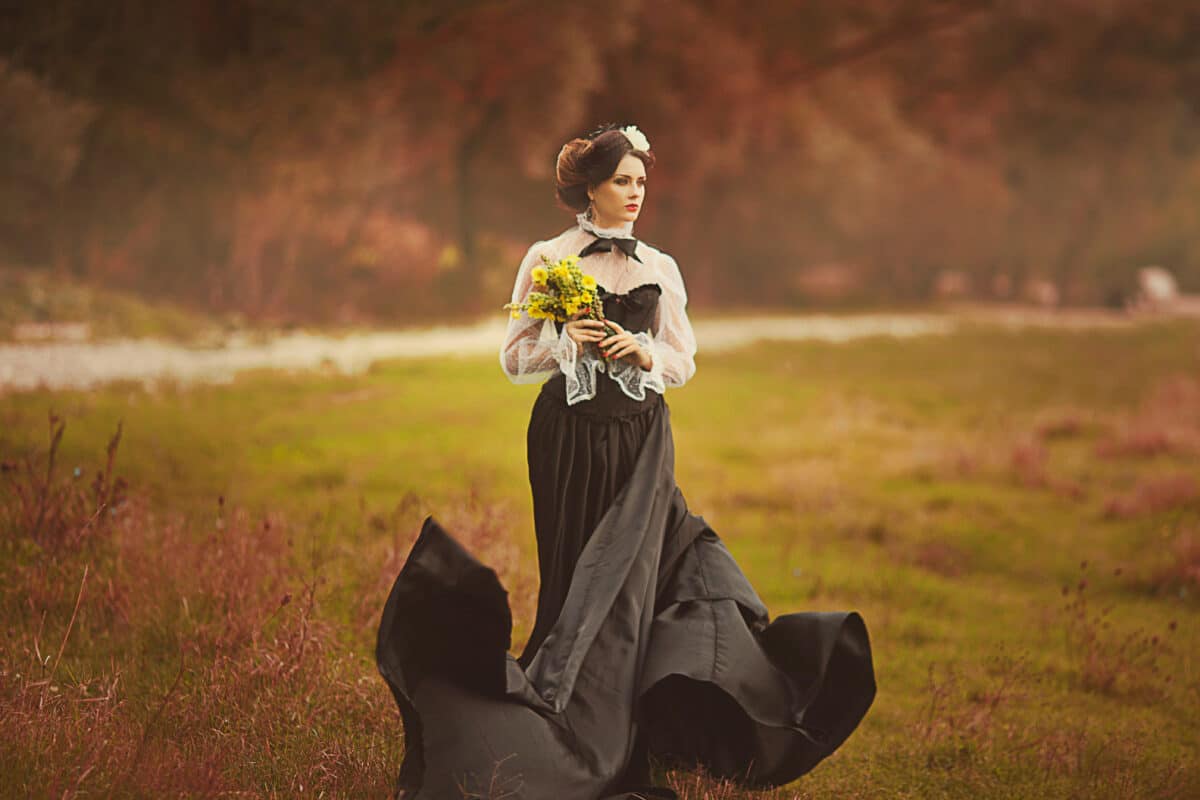
From “Autumn Musings” by Elizabeth Hazard
Yet, as we trace life’s ever-devious road,
Expectance cheers with hope of promis’d good;
Rich sun-tint o’er the uncertain future spreads,
And paints in life’s dull wastes enamel’d meads;
The youthful heart buoys with fair dreams of bliss,
And gives the nectar of heaven’s life to this.
What sweet illusions trance the ardent mind!
Fancy exalts, affections pure, refined,
Sees in the vista of the coming years
A thornless path undew’d with sorrow’s tears,
A happy home where cares can ne’er annoy,
And where undying love sheds light and joy.
Rhyming Poems About the Unknown

“Unknown” by Pamela S. Vining, (J. C. Yule)
Thou hast marked the lonely river,
On whose waveless bosom lay
Some deep mountain-shadow ever,
Dark’ning e’en the ripples’ play –
Didst thou deem it had no murmur
Of soft music, though unheard?
Deem that, ‘neath the quiet surface,
The calm waters never stirred?
Thou hast marked the pensive forest,
Where the moonbeams slept by night,
While the elm and drooping willow
Sorrowed in the misty light –
Didst thou think those depths so silent
Held no fount of tender song
That awoke to hallowed utt’rance
As the hushed hours swept along?
So, the heart hath much of music,
Deep within its fountains lone,
Very passionate and tender,
Never shaped to human tone!
Dream not that its depths are silent,
Though thou ne’er hast stooped to hear;
Haply, even thence some music
Floats to the All-Hearing ear!
“Unknown” by Henry Lawson
Oh, the wild black swans fly westward still,
While the sun goes down in glory —
And away o’er lonely plain and hill
Still runs the same old story:
The sheoaks sigh it all day long —
It is safe in the Big Scrub’s keeping —
‘Tis the butcher-birds’ and the bell-birds’ song
In the gum where ‘Unknown’ lies sleeping —
(It is heard in the chat of the soldier-birds
O’er the grave where ‘Unknown’ lies sleeping).
Ah! the Bushmen knew not his name or land,
Or the shame that had sent him here —
But the Bushmen knew by the dead man’s hand
That his past life lay not near.
The law of the land might have watched for him,
Or a sweetheart, wife, or mother;
But they bared their heads, and their eyes were dim,
For he might have been a brother!
(Ah! the death he died brought him near to them,
For he might have been a brother.)
Oh, the wild black swans to the westward fade,
And the sunset burns to ashes,
And three times bright on an eastern range
The light of a big star flashes,
Like a signal sent to a distant strand
Where a dead man’s love sits weeping.
And the night comes grand to the Great Lone Land
O’er the grave where ‘Unknown’ lies sleeping,
And the big white stars in their clusters blaze
O’er the Bush where ‘Unknown’ lies sleeping.
“The Unknown Course” by Arthur Hugh Clough
Where lies the land to which the ship would go?
Far, far ahead, is all her seamen know;
And where the land she travels from? Away,
Far, far behind, is all that they can say.
On sunny noons upon the deck’s smooth face,
Linked arm in arm, how pleasant here to pace!
Or, o’er the stern reclining, watch below
The foaming wake far widening as we go.
On stormy nights, when wild Northwesters rave,
How proud a thing to fight with wind and wave!
The dripping sailor on the reeling mast
Exults to bear, and scorns to wish it past.
Where lies the land to which the ship would go?
Far, far ahead, is all her seamen know.
And where the land she travels from? Away,
Far, far behind, is all that they can say.
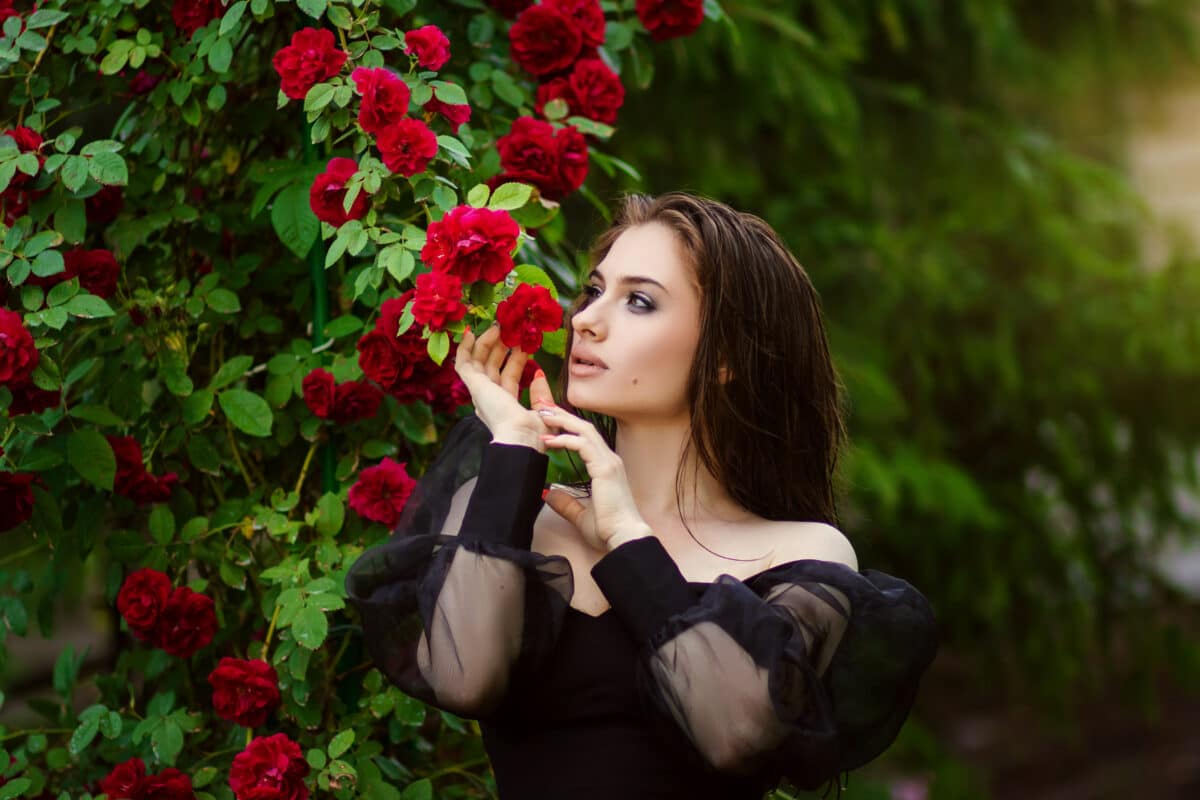
From “Loss, Or Gain?” by Sidney Royse Lysaght
If it be ours to return one day,
How shall we greet them empty-handed?
What shall we tell of the unknown country?
How shall we chart the unknown way?
What will they hold the tidings worth
Of shoreless seas at the ends of the earth?
Whose are the treasures of gold and silver,
Theirs who venture, or theirs who stay?
They have triumphed where we have failed;
They have obeyed where we revolted;
Theirs the blessings of harvests tended,
Ours the lashings of storms out- sailed.
Content were they with their destined lot:
We sought a greater and found it not.
They bowed their necks to the yoke and fattened:
We have wrestled with God, and God prevailed.
“The Secret Of The Deeps” by Sidney Royse Lysaght
We sailed by the old world’s tideways, down
through the long sea-lanes,
Into the ends of the south, over horizons
new;
Deeper the skies rose o’er us, and round us the
ocean plains
Were held in a lonelier silence and folded in
softer blue.
There are no farther skies, no lonelier seas to
seek,
Never a bourne remoter for wandering sail
to find.
But we hear no voice that is new,—the wind
and the water speak
As they spoke of old on the seas of the
world we left behind.
The mystery eternal, that troubled the world of
old,
Here, in the midnight stillness, moves on the
unknown deeps;
And here the ancient secret, that never to man
was told,
The rose of the morning treasures, the blue
of the noonday keeps.
Haply, we think, the secret may be shown to
us here and now,
Far from the land’s disquiet and the world’s
unresting crowds:
And near it seemed in the whisper of ripples
beneath the bow;
Half won, then lost, in the sighing of wind
at night in the shrouds.
When the sea began to reveal it, when its azure
almost gave
The key, a wandering cloud stole it, bore it
afar.
And again we had all but read it in the track
of a star on the wave,
And lo! it was gone, aloof in the silence
beyond the star.
So passed we out of that ocean, as guests from
a dim-lit hall
When the night is late, and the sound of the
music is heard no more,
And ghostly voices whisper, and soundless foot
steps fall,
Under the silent roof-tree, over the windy
floor..
“Far South” by Sidney Royse Lysaght
The far green shores amid the seas of gray,
The stars above the land we used to know,
We had forgotten,—’twas so far away,—
We had forgotten,—’twas so long ago.
Our lonely pilot was the wandering breeze
Whose voice we heard at midnight in the shrouds;
We followed in the moon, o’er unknown seas,
The pilgrimage of silver-hooded clouds;
With rolling mists we drifted , or we steered
To lights that with the morning disappeared.
No sail, nor shore; but once at flash of dawn,
When farthest from the world we knew withdrawn,
We saw green peaks and towers of ice arise
Against the wild-rose of Antarctic skies;
And, over violet seas, the Eastern glow
Fell on an iceberg’s wandering hills of snow.
And, with the sunrise, pinnacles and spires
And crags and headlands flashed in silver fires;
And crystal waters broke on silver shores,
And filled its caves’ reverberant corridors.
But, with the coming of the full blue day,
White, like a ship of ghosts, it passed away.
And lonelier seemed our pathway than before,
And farther off the undiscovered shore.
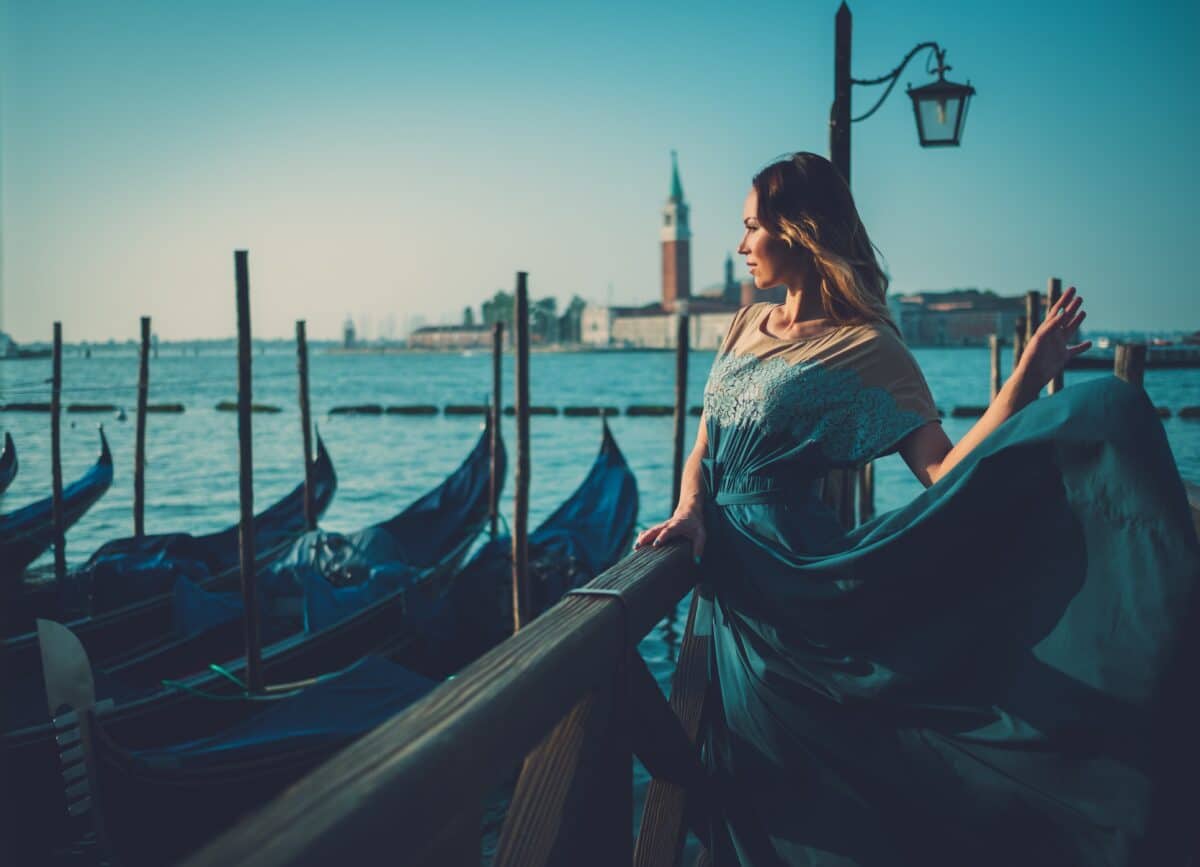
“A Haven” by Sidney Royse Lysaght
Ships are anchored, sails are furled,
Shore-lights in the dusk appear ;
Faint, and far away, we hear
Roaring sea-ways of the world.
In the haven’s sheltered walls
Soft the starry silence falls ;
Winds that drove us through the deep
Touch us now as soft as sleep ;
Waves that smote before are now
Rippled whispers at the bow.
Dim lights glimmer on the ships,
Shadowy figures cross the decks,
Golden flashing phosphor- specks
Sparkle where an oar blade dips.
Large, above the steady spars,
Shine the radiant southern stars ;
Falls, from crystal heights of air,
Sound of wings that sea-ward fare;
Inland, still and dark and lone,
Night enfolds a land unknown.
Weary wanderers may stay
Here awhile the unknown quest;
Seekers of the far-away
Here a little while may rest.
From “Babyhood” by Josiah Gilbert Holland
Who can tell what a baby thinks?
Who can follow the gossamer links
By which the manikin feels his way
Out from the shore of the great unknown,
Blind, and wailing, and alone,
Into the light of day?—
Out from the shore of the unknown sea,
Tossing in pitiful agony,—
Of the unknown sea that reels and rolls,
Specked with the barks of little souls,
Barks that were launched on the other side,
And slipped from Heaven on an ebbing tide!
What does he think of his mother’s eyes?
What does he think of his mother’s hair?
What of the cradle-roof that flies
Forward and backward through the air?
What does he think of his mother’s breast
Bare and beautiful, smooth and white,
Seeking it ever with fresh delight –
Cup of his life and couch of his rest?
“Doubt” by Sir Edward Bulwer Lytton
Bright laughs the sun; the birds, that are to air
Like song to life, are gaily on the wing;
In every mead the handmaid hours prepare
The delicates of spring;
But, if she love me not!
To me at this fair season still hath been
In every wild-flower an exhaustless treasure,
And, when the young- eyed violet first was seen,
Methought to breathe was pleasure ;-
But, if she love me not!
How, in thy twilight, Doubt, at each unknown
Dim shape, the superstitious Love will start ;
How Hope itself will tremble at its own
Light shadow on the heart!—
Ah, if she love me not!
Well; I will know the worst, and leave the wind
To drift or drown the venture on the wave;
Life has two friends in grief itself most kind—
Remembrance and the Grave
Mine, if she love me not.
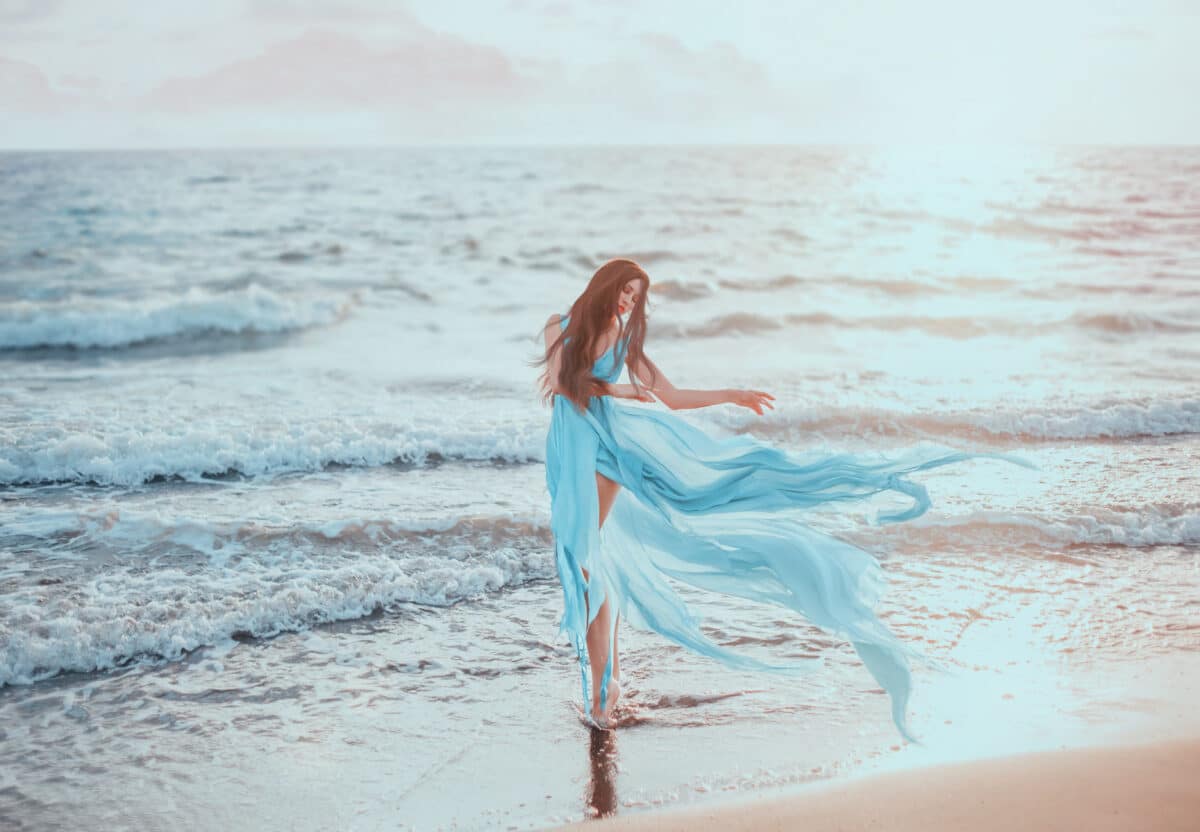
From “The Ends Of The Earth” by Sidney Royse Lysaght
For the spell of the unfound shore has gathered above our own;
And the magic of old sea dreams is treasured in wayside flowers;
And tidings of Love immortal are whispered from vanishing hours;
And the secret of unknown beauty trembles at heart of the known.
The music the world once heard we hear in a softer key;
And a meaning the old world missed awakens in ancient song;
And the dream that the old world dreamed the ages for us prolong
In the sound of the wind, and the ripple of waves, and the call of the sea.
“The New Arrival” by George Washington Cable
There came to port last Sunday night
The queerest little craft,
Without an inch of rigging on;
I looked and looked-and laughed!
It seemed so curious that she
Should cross the Unknown water,
And moor herself within my room
My daughter! O, my daughter!
Yet by these presents witness all
She’s welcome fifty times,
And comes consigned in hope and love
And common-metre rhymes.
She has no manifest but this;
No flag floats o’er the water;
She’s too new for the British Lloyds
My daughter! O, my daughter!
Ring out, wild bells- and tame ones too;
Ring out the lover’s moon.
Ring in the little worsted socks,
Ring in the bib and spoon.
Ring out the muse, ring in the nurse,
Ring in the milk and water.
Away with paper, pen, and ink
My daughter! O, my daughter!
From “To An Unknown Reader” by Walter Malone
In years to come, when I have passed away,
Your careless glance upon this page may fall;
So then, my unknown reader, pause, I pray,
And hearken to my faint and far-off call .
O youth, as graceful as a willow bough,
As gladsome as a fawn with nimble feet;
O youth, with noble alabaster brow,
Flushed with your morning splendor, fresh and sweet:—
Dear boy, mine ears shall never know your voice,
Mine eyes shall never know your princely grace,
And I shall never in your smile rejoice,
And never, never see your fine frank face.
O maiden, with the starry eyes of brown,
With golden ringlets, peach-bloom cheeks aglow;
O maiden, wearing love’s and beauty’s crown,
As radiant as a sunrise over snow:—
Dear girl, I never by your side shall tread,
And never shall I hear your gentle sighs;
I never shall behold your lips of red,
And never, never see your splendid eyes.
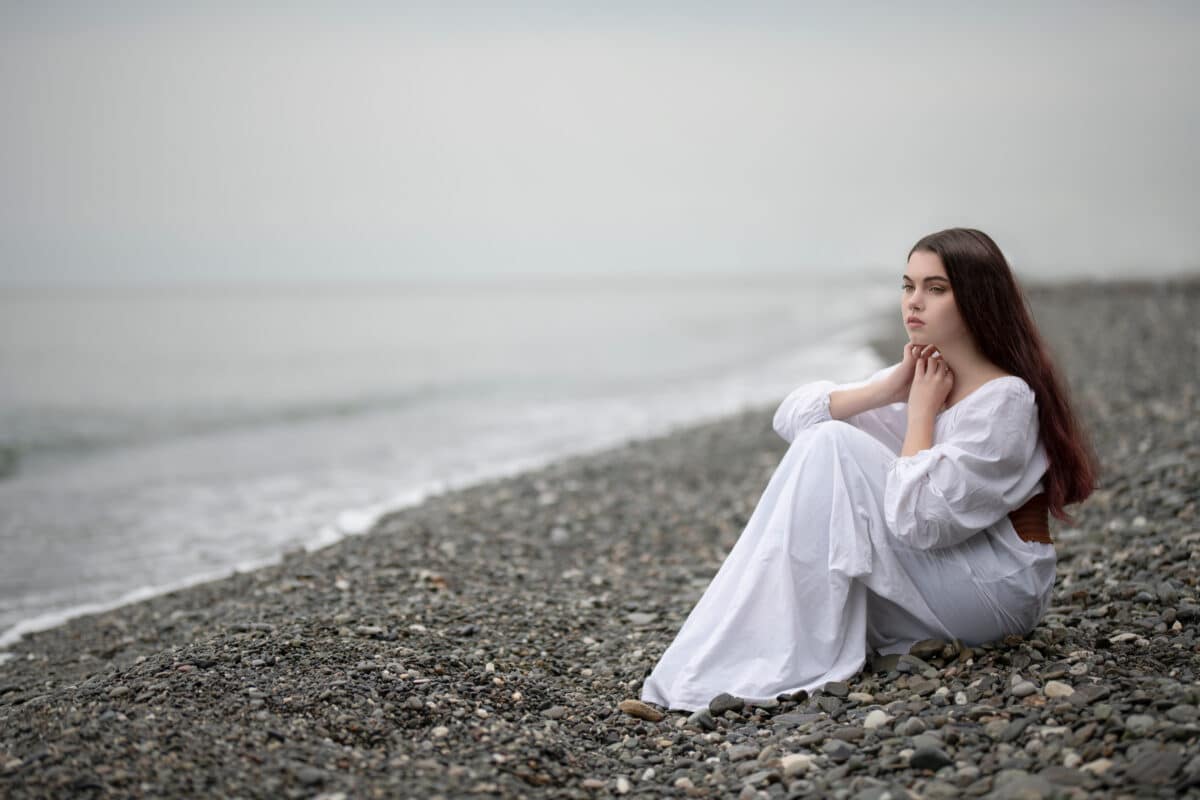
“To Lucasta, Going Beyond The Seas” by Richard Lovelace
If to be absent were to be
Away from thee;
Or that when I am gone
You or I were alone ;
Then, my Lucasta, might I crave
Pity from blustering wind or swallowing wave.
But I’ll not sigh one blast or gale
To swell my sail,
Or pay a tear to ‘ suage
The foaming blue god’s rage;
For whether he will let me pass
Or no, I’m still as happy as I was.
Though seas and land betwixt us both,
Our faith and troth,
Like separated souls,
All time and space controls :
Above the highest sphere we meet
Unseen, unknown; and greet as Angels greet.
So then we do anticipate
Our after-fate,
And are alive in the skies,
If thus our lips and eyes
Can speak like spirits unconfined
In Heaven, their earthy bodies left behind.
“The First Violets” by Sir Edward Bulwer Lytton
Who that has loved knows not the tender tale
Which flowers reveal, when lips are coy to tell?
Whose youth has paused not, dreaming, in the vale
Where the rath violets dwell?
Lo, where they shrink along the lonely brake,
Under the leafless melancholy tree;
Not yet the cuckoo sings, nor glides the snake,
Nor wild thyme lures the bee;
Yet at their sight and scent entranced and thrall’d ,
All June seems golden in the April skies ;
How sweet the days we yearn for-till fulfill’d :
O distant Paradise,
Dear Land to which Desire for ever flees;
Time doth no Present to our grasp allow,
Say, in the fix’d Eternal shall we seize
At last the fleeting Now ?
Dream not of days to come-of that Unknown
Whither Hope wanders-maze without a clue;
Give their true witchery to the flowers; -thine own
Youth in their youth renew.
Avarice, remember when the cowslip’s gold
Lured and yet lost its glitter in thy grasp.
Do thy hoards glad thee more than those of old?
Those wither’d in thy clasp,
From these thy clasp falls palsied. It was then.
That thou wert rich-thy coffers are a lie;
Alas, poor fool! Joy is the wealth of men,
And Care their penury.
Come, foil’d Ambition, what hast thou desired?
Empire and power?—O, wanderer, tempest-tost!
These once were thine, when life’s gay spring inspired
Thy soul with glories lost.
Let the flowers charm thee back to that rich time
When golden Dreamland lay within thy chart,
When Love bestow’d a realm indeed sublime
The boundless human heart.
Hark, hark again, the tread of bashful feet!
Hark the boughs rustling round the trysting-place!
Let air again with one dear breath be sweet,
Earth fair with one dear face.
Brief-lived, first flowers-first love ! The hours steal on
To prank the world in summer’s pomp of hue;
But what can flaunt beneath a fiercer sun
Worth what we lose in you?
Oft by a flower, a leaf, in some loved book
We mark the lines that charm us most; -Retrace
Thy life ;-recall its loveliest passage ;-Look,
Dead violets keep the place!
“An Invitation” by Frances Anne Butler
Come where the white waves dance along the shore
Of some lone isle, lost in the unknown seas;
Whose golden sands by mortal foot before
Were never printed,—where the fragrant breeze,
That never swept o’er land or flood that man
Could call his own, th’ unearthly breeze shall fan
Our mingled tresses with its odorous sighs;
Where the eternal heaven’s blue, sunny eyes
Did ne’er look down on human shapes of earth,
Or aught of mortal mould and death-doomed birth:
Come there with me; and when we are alone
In that enchanted desert, where the tone
Of earthly voice, or language, yet did ne’er
With its strange music startle the still air,
When clasped in thy upholding arms I stand,
Upon that bright world’s coral-cradled strand,
When I can hide my face upon thy breast,
While thy heart answers mine together pressed,
Then fold me closer, bend thy head above me,
Listen—and I will tell thee how I love thee.
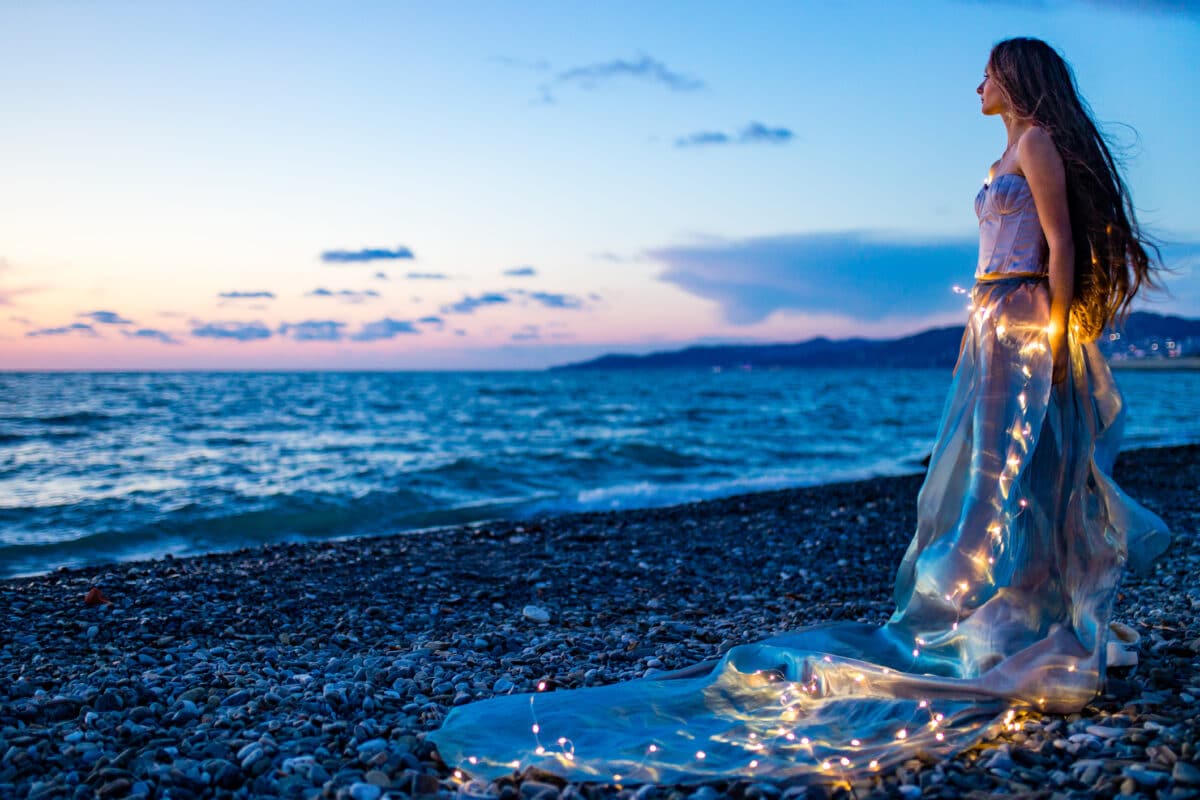
From “The Whip-Poor-Will” by Henry Van Dyke
You seemed so long in coming,
I felt so much alone;
The wide, dark world was round me,
And life was all unknown;
The hand of sorrow touched me,
And made my senses thrill
With all the pain that haunts the strain
Of mournful whip-poor-will.
“Whippoorwill! whippoorwill!”
Sad and shrill,—“whippoorwill!”
Famous Poems About the Unknown

“The Unknown Eros” by Coventry Patmore
What rumour’d heavens are these
Which not a poet sings,
O, Unknown Eros? What this breeze
Of sudden wings
Speeding at far returns of time from interstellar space
To fan my very face,
And gone as fleet,
Through delicatest ether feathering soft their solitary beat,
With ne’er a light plume dropp’d, nor any trace
To speak of whence they came, or whither they depart?
And why this palpitating heart,
This blind and unrelated joy,
This meaningless desire,
That moves me like the Child
Who in the flushing darkness troubled lies,
Inventing lonely prophecies,
Which even to his Mother mild
He dares not tell;
To which himself is infidel;
His heart not less on fire
With dreams impossible as wildest Arab Tale,
(So thinks the boy,)
With dreams that turn him red and pale,
Yet less impossible and wild
Than those which bashful Love, in his own way and hour,
Shall duly bring to flower ?
O, Unknown Eros, sire of awful bliss,
What portent and what Delphic word,
Such as in form of snake forbodes the bird,
Is this?
In me life’s even flood
What eddies thus?
What in its ruddy orbit lifts the blood
Like a perturbed moon of Uranus
Reaching to some great world in ungauged darkness hid;
And whence
This rapture of the sense
Which, by thy whisper bid,
Reveres with obscure rite and sacramental sign
A bond I know not of nor dimly can devine;
This subject loyalty which longs
For chains and thongs
Woven of gossamer and adamant,
To bind me to my unguess’d want,
And so to lie,
Between those quivering plumes that thro’ fine ether pant,
For hopeless, sweet eternity?
What God unhonour’d hitherto in songs,
Or which, that now
Forgettest the disguise
That Gods must wear who visit human eyes,
Art Thou?
Thou art not Amor; or, if so, yon pyre,
That waits the willing victim, flames with vestal fire;
Nor mooned Queen of maids; or, if thou’rt she,
Ah, then, from Thee
Let Bride and Bridegroom learn what kisses be!
In what veil’d hymn
Or mystic dance
Would he that were thy Priest advance
Thine earthly praise, thy glory limn?
Say, should the feet that feel thy thought
In double-center’d circuit run,
In that compulsive focus, Nought,
In this a furnace like the sun;
And might some note of thy renown
And high behest
Thus in enigma be express’d:
“There lies the crown
“Which all thy longing cures.
“Refuse it, Mortal, that it may be your’s!
“It is a Spirit, though it seems red gold;
“And such may no man, but by shunning, hold.
“Refuse it, though refusing be despair;
“And thou shalt feel the phantom in thy hair.”
“The Unknown” by Edgar Lee Masters
Ye aspiring ones, listen to the story of the unknown
Who lies here with no stone to mark the place.
As a boy reckless and wanton,
Wandering with gun in hand through the forest
Near the mansion of Aaron Hatfield,
I shot a hawk perched on the top
Of a dead tree.
He fell with guttural cry
At my feet, his wing broken.
Then I put him in a cage
Where he lived many days cawing angrily at me
When I offered him food.
Daily I search the realms of Hades
For the soul of the hawk,
That I may offer him the friendship
Of one whom life wounded and caged.
“The Unknown God” by Henry Lawson
The President to Kingdoms,
As in the Days of Old;
The King to the Republic,
As it had been foretold.
They could not read the spelling,
They would not hear the call;
They would not brook the telling
Of Writing on the Wall.
I buy my Peace with Slaughter,
With Peace I fashion War;
I drown the land with water,
With land I build the shore.
I walk with Son and Daughter
Where Ocean rolled before.
I build a town where sea was
A tower where tempests roar.
From bays in distant islands,
And rocks in lonely seas,
With unseen Death in silence
I smite mine enemies!
The great Cathedral crashes
Where once a city stood;
I build again on ashes
And breed on clotted blood!
I link the seas together,
And at my sign and will
The train runs on the ocean bed,
The great ship climbs the hill!
For pastime I flood deserts
With water from the rill;
And in my tireless leisure hours
I empty lakes, and fill.
I plumb the seas beneath us
And fathom skies above,
Yet I make Peace for hatred
And I make War for love.
I race beneath the ranges
And sit where Mystery dwells
Yet mankind sees no changes,
They ask for miracles!
I own the world and span its
Lone lands from Pole to Pole;
I live in other planets,
Yet do not know my soul
The soul that none may fathom,
Whose secrets none may tell,
The soul that none may humble,
The Soul Unconquerable!
I am the God of Ages!
I am the Unknown God!
My life is written pages
Wherever man hath trod.
From bounds of Polar regions,
To where the Desert reigns,
I’ve left my myriad legions
On countless vanished plains.
And I shall reign for ever
On earth while oceans roll,
In shape of man, or woman,
Through my immortal soul;
Yet I can love and suffer,
Be angry, or be mild,
And I can bow me down and weep
Just like a mortal child.
I conquer Death and Living,
And Fiends in shape of men,
For I rejoice in giving
Not to receive again.
For I am Man! and Mortal!
And Mammon’s Towers must fall,
Though Greed draws all his pencils through
The Writing on the Wall!
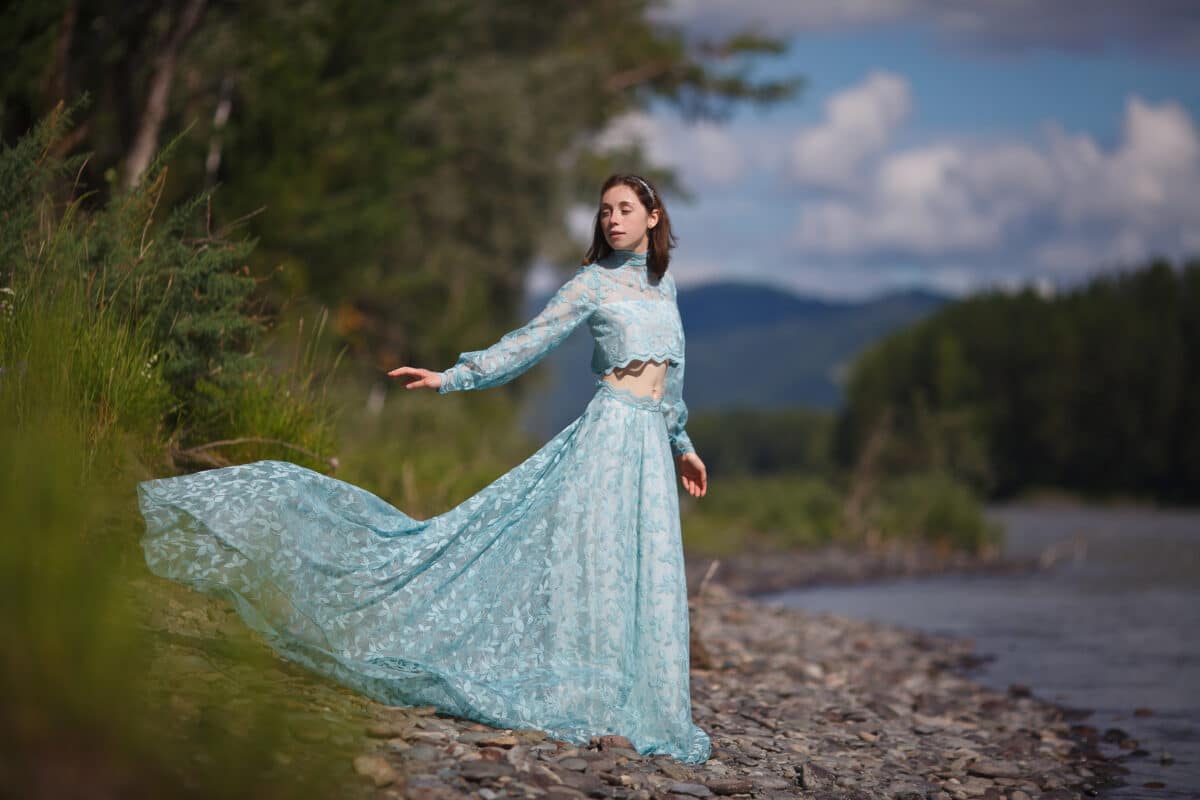
“Solitude” by Walter Malone
He who ascends the cloud-encircled peak
And gropes alone through mist when twilight comes,
When all the rocks are veiled in gloomy gray,
Has trembled in a fearful Solitude.
He who has trod the trackless wilderness
Where giant trees turn noontide into night,
Where monstrous vines are twisting coil on coil,
Where unknown birds chirp through the loneliness,
And unknown beasts are crying from afar, —
Has felt an awful silence in his soul.
He who, shipwrecked, a thousand miles from land,
Drifts on and on, and never sights a sail,
With but a stormy petrel flitting by,
Has longed to clasp a helping hand again.
He who has wandered through a foreign land,
And trod a giant city’s crowded streets ,
And knows no one amid the myriad throngs,
And only hears an unfamiliar tongue,
He, too, has known the depths of loneliness.
He who imprisoned in a dungeon cell,
Sees no one, but beholds a stealthy hand
Slip through the iron grating day by day,
And leave a cup of water, crust or bone,
And cowers in that dungeon thirty years,
Yet never knows his captor or his crime,
He, too, has craved a comrade’s sympathy.
But still, my soul, your awful solitude
Is more than his who climbs the mountain peak,
Than his who treads the trackless wilderness,
Than that of him adrift upon a spar,
Than that of him lost in a foreign town.
More lonely than the prisoner in his cell
Are you, O soul, whom no man ever knows.
You strive to speak, but none will understand,
You call for help, but no one ever comes.
No friend can ever share your confidence,
No spouse the secret chamber of your mind!
Wise men may read the ruined monuments
Which tell the stories of forgotten kings,
May read the parchment or the papyrus,
And learn the legends of forgotten years,
But none may translate from the secret book
Locked in the dungeon seen by you alone.
O, Soul, you sail strange oceans like a ship
Steered by a pilot whom you never see,
Ruled by a captain you have never known,
Bound from a land you cannot recollect,
And destined for a harbor never told.
Come, tell me, are you seeking for a strand
Where tufted palms wave under blissful skies?
Or, are you only speeding on your way
To wreck your cargo on a desert shore?
Or, are you only hastening after all
To sink forever in the ocean waves?
Sometimes I see another ship afar,
And clap my hands and cry, “A sail! A sail! “
I wave a signal, never understood,
And then the bark fades swiftly from my sight.
O, soul, amid your awful solitude
You sail without a compass or a chart.
No consort cleaves the ocean by your side,
You know not whence you came, nor where you go.
“Legem Tuam Dilexi” by Coventry Patmore
The “Infinite.” Word horrible! at feud
With life, and the braced mood
Of power and joy and love;
Forbidden, by wise heathen ev’n, to be
Spoken of Deity,
Whose Name, on popular altars, was “The Unknown,”
Because, or ere It was reveal’d as One
Confined in Three,
The people fear’d that it might prove
Infinity,
The blazon which the devils desired to gain;
And God, for their confusion, laugh’d consent ;
Yet did so far relent,
That they might seek relief, and not in vain,
In dashing of themselves against the shores of pain.
Nor bides alone in hell
The bond-disdaining spirit boiling to rebel.
But for compulsion of strong grace,
The pebble in the road
Would straight explode,
And fill the ghastly boundlessness of space.
The furious power,
To soft growth twice constrain’d in leaf and flower,
Protests, and longs to flash its faint self far
Beyond the dimmest star.
The same
Seditious flame,
Beat backward with reduplicated might,
Struggles alive within its stricter term,
And is the worm.
And the just Man does on himself affirm
God’s limits, and is conscious of delight,
Freedom and right,
And so His Semblance is, Who, every hour,
By day and night,
Buildeth new bulwarks ‘ gainst the Infinite.
For, ah, who can express
How full of bonds and simpleness
Is God,
How narrow is He,
And how the wide waste field of possibility
Is only trod
Straight to His homestead in the human heart,
And all His art
Is as the babe’s, that wins his Mother to repeat
Her little song so sweet!
What is the chief news of the Night?
Lo, iron and salt, heat, weight and light
In every star that drifts on the great breeze!
And these
Mean Man,
Darling of God, Whose thoughts but live and move
Round him ; Who woos his will
To wedlock with His own, and does distil
To that drop’s span
The attar of all rose-fields of all love!
Therefore the soul select assumes the stress
Of bonds unbid, which God’s own style express
Better than well,
And aye hath borne,
To the Clown’s scorn,
The fetters of the threefold golden chain :
Narrowing to nothing all his worldly gain ;
(Howbeit in vain ;
For to have nought
Is to have all things without care or thought!)
Surrendering, abject, to his equal’s rule,
As though he were a fool,
The free wings of the will;
(More vainly still;
For none knows rightly what ‘ tis to be free
But only he
Who, vow’d against all choice, and fill’d with awe
Ofthe ofttimes dumb or clouded Oracle,
Does wiser than to spell,
In his own suit, the least word of the Law!)
And lastly bartering life’s dear bliss for pain;
But evermore in vain;
For joy (rejoice ye Few that tasted have!)
Is Love’s obedience
Against the genial laws of natural sense,
Whose wide, self-dissipating wave,
Prison’d in artful dykes,
Trembling returns and strikes
Thence to its source again,
In backward billows fleet,
Crest crossing crest ecstatic as they greet;
Thrilling each vein,
Exploring every chasm and cove
Of the full heart with floods of honied love,
And every principal street
And obscure alley and lane
Of the intricate brain
With brimming rivers of light and breezes sweet
Of the primordial heat;
Till, unto view of me and thee,
Lost the intense life be,
Or ludicrously display’d, by force
Of distance, as a soaring eagle, or a horse
On far-off hillside shewn,
May seem a gust-driv’n rag or a dead stone.
Nor by such bonds alone But more I leave to say,
Fitly revering the Wild Ass’s bray
Also his hoof,
Of which, go where you will, the marks remain
Where the religious walls have hid the bright reproof.
From “The Rosy Bosom’d Hours” by Coventry Patmore
You stept from rock to rock,
One hand quick tightening upon mine,
One holding up your frock.
On starfish and on weeds alone
You seem’d intent to be :
Flash’d those great gleams of hope unknown
From you, or from the sea ?
Ne’er came before, ah, when again
Shall come two days like these :
Such quick delight within the brain,
Within the heart such peace ?
I thought, indeed, by magic chance,
A third from Heaven to win,
But as, at dusk, we reach’d Penzance,
A drizzling rain set in.
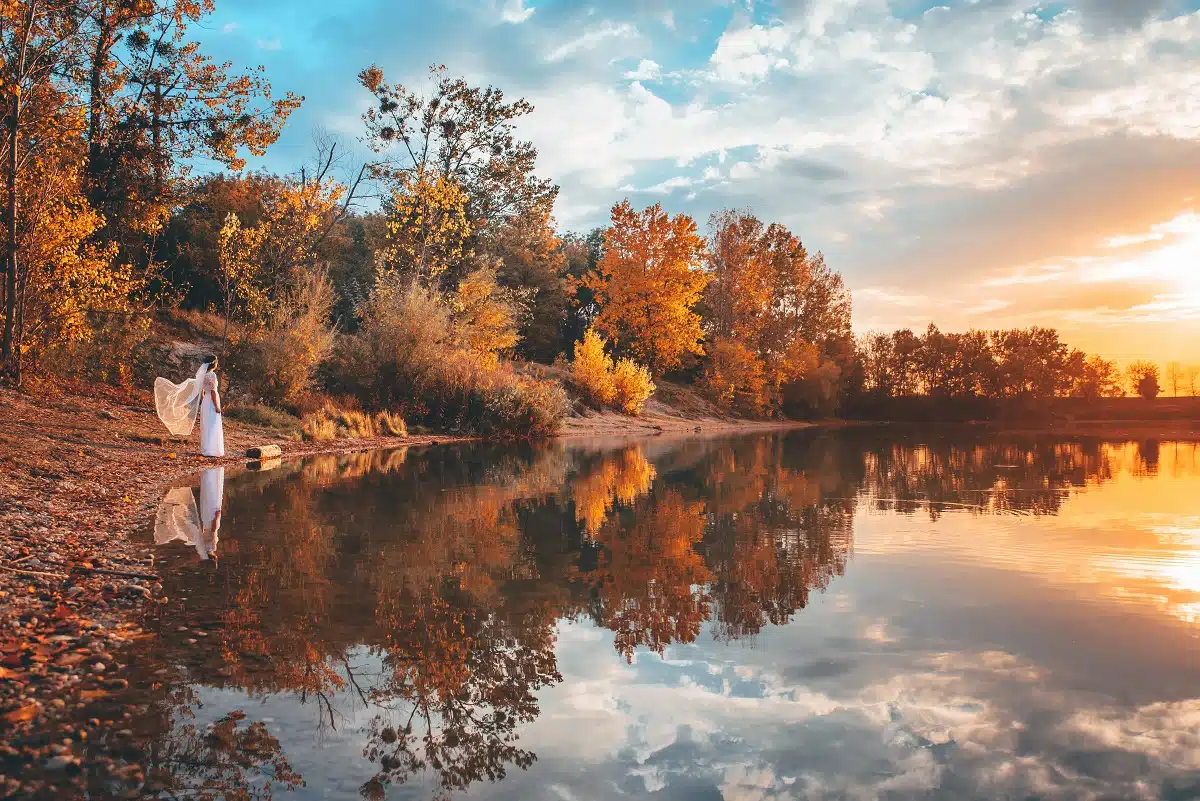
“Genevieve Mar” by Walter Malone
Genevieve Mar, by the Autumn sea,
Where the billows break and the shadows flee;
Where the shells are cast on the shifting sands,
And the curlews flit from their unknown lands;
Where the light-house glares on the jutting cape,
And the gray sky sweeps to the gray landscape,
I know you remember your lover afar,
With a lead-laden heart, O Genevieve Mar.
Genevieve Mar, as the ravens call,
And the peach is a-mould by the orchard wall;
As the dead leaves flit on the misty air,
And the oak and elm are lonesome and bare;
As the raincloud comes, and the daylight dies,
And the dead grass waves, and the north wind sighs,
Your heart is adrift like a shattered spar,
And your soul is a wreck, O Genevieve Mar.
Genevieve Mar, when the Autumn comes,
And the billows boom like a throb of drums,
The weeds that have grown in depths of the seas
Turn purple and brown like boughs of the trees.
So down in your heart the joys of the past
Are withered and sere and sullied at last;
The Autumn has come over breaker and bar,
Breathing death to your dreams, O Genevieve Mar.
Genevieve Mar, you remember one
Who trod by your side in the April sun ;
He gave you his life when he gave you his love,
Then you cast him aside like an outworn glove.
But you longed at last for days that were dead
Ah, you can not win Love when his Summer has fled!
Too late! for your heart is seared with a scar,
On your soul is a blight, O Genevieve Mar.
“The Moon-Flower” by Walter Malone
I see the splendor of thy blooms of white,
Spotless and stainless as a cherub’s plume,
Adorning solemn shadows of the night,
As though to waste thy glory on the gloom.
Not like the gorgeous blossoms of the morn,
In princely purple or in royal red,
Amid the glories of the sunrise born,
To wither when their lover, Dawn, lies dead;
Nor like thy radiant sisters of the noon,
With burning bosoms blushing in the sun,
Whose fierce embraces make them sway and swoon,
Until they perish as the day is done;
For they have felt their fervent love returned,
And all the ardor of a clasp and kiss ,
Have palpitated and have thrilled and burned
In sweet delirium of the lover’s bliss ;
While thou, pale virgin, pinest all alone,
A shrouded star, in ghostly robes of white;
No lover’s kiss thy pearl-pure face hath known
To make thee pant with passionate delight.
No brown bee ever comes to taste thy lips,
No bird will ever sing his songs to thee,
No sunbeam steals to touch thy tingling tips,
Thy maiden charms no bridal day shall see.
And yet, O peerless, pearly, pure moon flower,
Thy sweet mouth trembles with a strange perfume,
And thou dost make a heaven of thy bower
Though no true lover comes to cheer thy doom.
And so thy tale of love is never told,
Thy secret dieth with the morning light,
Though virgin bosoms throb, we call thee cold,
And see thee die in barrenness and blight.
And so True Love amid the darkness blooms,
In silence, desolation-all alone,
With snow-white splendor lost in mournful glooms,
And lives and dies unheeded or unknown.
From “The Ocean. From Canto IV” by Lord Byron
Roll on, thou deep and dark blue Ocean-roll!
Ten thousand fleets sweep over thee in vain;
Man marks the earth with ruin-his control
Stops with the shore ; upon the watery plain
The wrecks are all thy deed, nor doth remain
A shadow of man’s ravage, save his own,
When, for a moment, like a drop of rain,
He sinks into thy depths with bubbling groan,
Without a grave, unknelled, uncoffined, and unknown.

“Mourning” by Victor Hugo
Charles, Charles, my son! hast thou, then, quitted me?
Must all fade, naught endure?
Hast vanished in that radiance, clear for thee,
But still for us obscure?
My sunset lingers, boy, thy morn declines!
Sweet mutual love we’ve known;
For man, alas! plans, dreams, and smiling twines
With others’ souls his own.
He cries, “This has no end!” pursues his way:
He soon is downward bound:
He lives, he suffers; in his grasp one day
Mere dust and ashes found.
I’ve wandered twenty years, in distant lands,
With sore heart forced to stay:
Why fell the blow Fate only understands!
God took my home away.
To-day one daughter and one son remain
Of all my goodly show:
Wellnigh in solitude my dark hours wane;
God takes my children now.
Linger, ye two still left me! though decays
Our nest, our hearts remain;
In gloom of death your mother silent prays,
I in this life of pain.
Martyr of Sion! holding Thee in sight,
I’ll drain this cup of gall,
And scale with step resolved that dangerous height,
Which rather seems a fall.
Truth is sufficient guide; no more man needs
Than end so nobly shown.
Mourning, but brave, I march; where duty leads,
I seek the vast unknown.
“A Dream of the Unknown” by Percy Bysshe Shelley
I dream’d that as I wander’d by the way
Bare Winter suddenly was changed to Spring,
And gentle odours led my steps astray,
Mix’d with a sound of waters murmuring
Along a shelving bank of turf, which lay
Under a copse, and hardly dared to fling
Its green arms round the bosom of the stream,
But kiss’d it and then fled, as Thou mightest in dream.
There grew pied wind-flowers and violets,
Daisies, those pearl’d Arcturi of the earth,
The constellated flower that never sets;
Faint oxlips; tender blue-bells, at whose birth
The sod scarce heaved; and that tall flower that wets
Its mother’s face with heaven-collected tears,
When the low wind, its playmate’s voice, it hears.
And in the warm hedge grew lush eglantine,
Green cowbind and the moonlight-colour’d May,
And cherry-blossoms, and white cups, whose wine
Was the bright dew yet drain’d not by the day;
And wild roses, and ivy serpentine
With its dark buds and leaves, wandering astray;
And flowers azure, black, and streak’d with gold,
Fairer than any waken’d eyes behold.
And nearer to the river’s trembling edge
There grew broad flag-flowers, purple prank’t with white,
And starry river-buds among the sedge,
And floating water-lilies, broad and bright,
Which lit the oak that overhung the hedge
With moonlight beams of their own watery light;
And bulrushes, and reeds of such deep green
As soothed the dazzled eye with sober sheen.
Methought that of these visionary flowers
I made a nosegay, bound in such a way
That the same hues, which in their natural bowers
Were mingled or opposed, the like array
Kept these imprison’d children of the Hours
Within my hand,—and then, elate and gay,
I hasten’d to the spot whence I had come
That I might there present it—O! to whom?
